3 Mistakes That Could Cause Your Photography Business to Fail

photo by PeopleImages via iStock
Starting a business is a lot of work. Making it a success over the long term is a lot more work.
There’s many reasons why most businesses fail in the first year - a lack of proper planning, poor leadership, and no differentiation in the market to name a few.
Your business can also fail thanks to mistakes that are made that make it even more difficult to achieve success.
Below, I’ve outlined three mistakes that could cause your photography business to fail and the solutions you need to avoid making them.
Photography Business Mistake #1: Going Without Insurance

photo by skynesher via
Photography gear is really expensive, yet some photographers elect to go without insurance for their it.
It just doesn’t make sense…
If a calamity occurs - an earthquake, a fire, or a flood, for example - and your gear is damaged, how do you expect to make any money?
Likewise, what if you accidentally damage a lens and can’t afford to have it repaired because you don’t have equipment insurance?
Having the right equipment insurance policy is a must-have for photographers so these sorts of events don’t derail your progress toward success.
Athos Insurance Services offers photographers an equipment policy that has wide coverage for damage that occurs to your gear as a result of natural disasters, acts of terrorism, explosions, lightning, and other major events.
The policy also covers you if you accidentally damage your gear and if your gear is lost or stolen. That coverage extends worldwide, so if you have to travel outside the U.S., you can rest assured that if something does happen to your gear, your business won’t suffer because of it.
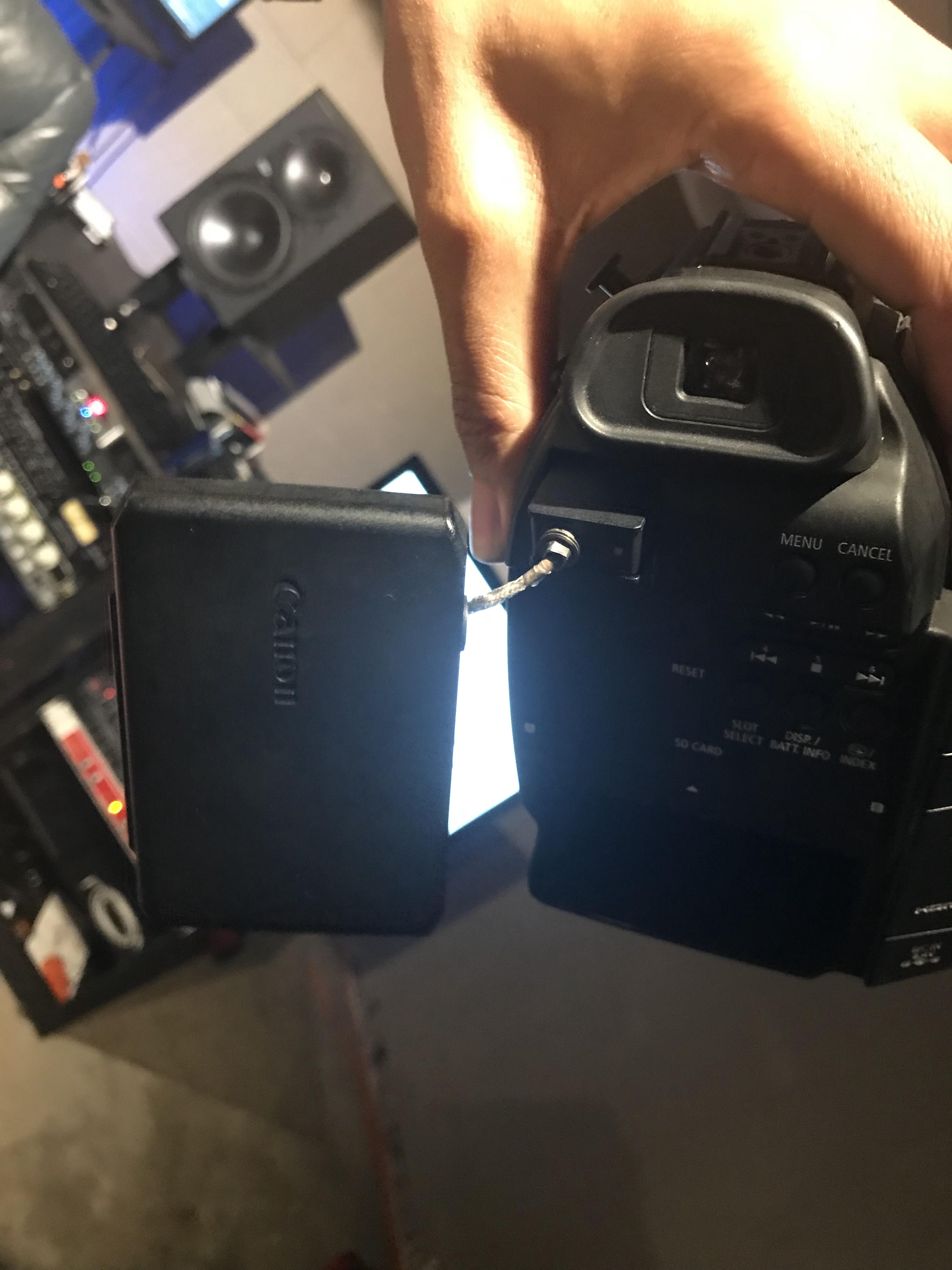
Athos Insurance offers replacement cost coverage, which means your gear can be replaced with brand-new or like-kind items.
On top of that, Athos is dedicated to providing top-notch customer service that makes it easy for you to ask questions and get answers. You can even get a quote online in a matter of minutes and purchase a policy online as well.
Athos Insurance Services is an ideal partner for any professional photographer. They have the coverage you need at a price that won’t break the bank. When you’re trying to establish a successful business, that’s just the combination of services and price you need!
Learn More:
Photography Business Mistake #2: Your Brand Doesn’t Include You

photo by natasaadzicvia iStock
There’s a reason why photographers are behind the lens - many of us don’t like the limelight.
That desire to stay behind the scenes can lead to a very common mistake, though. Without injecting yourself into your brand and making it personal and specific to you, you run the risk of your brand being unidentifiable and bland.
This doesn’t mean that you need to redo your logo to include your face or have life-size cutouts of yourself all over town.But what it does mean is that you need to inject a little of yourself into your overall marketing plan.
![]()
For example, post periodic videos on your Facebook page so people can associate your face and voice with your brand. These videos don’t have to be long, detailed, or even professionally done. Just do a quick one-minute photography tip every now and then, and people will come to associate you with your brand.
Another idea is to inject a little bit of your personal life into your marketing.

photo by zeljkosantrac via iStock
Potential clients want to be able to connect with you on a deeper level than “oh that’s the gal that has the photography studio.” To foster that connection, tell people a little about yourself, post behind-the-scenes photos from your work, or even post personal photos of you and your friends or family.
Doing so will help you build connections, build trust, and will help you get more clients through your door.
Learn More:
Photography Business Mistake #3: There’s No Follow Up

photo by MartinPrescott via iStock
One of the most common photography business mistakes is a simple lack of following up with potential clients.
If someone contacts you and you respond to them, answer their questions, and they want to think about it, your job is not done. You need to follow up!
Though most photographers don’t want to be a pushy salesman, at the end of the day, pursuing every lead is necessary for you to get people in the door and money in your pocket.
But following up doesn’t have to pushy…

photo by MartinPrescott via iStock
Instead, just do a simple check-in. A quick call, text, or email letting the potential client know that you enjoyed talking with them and that you’re available to answer any other questions could make the difference between getting the gig and not.
People are busy with work, kids, life, bills, and so forth, so it’s easy for past communications to get lost in the fray. By following up, you bring yourself back to the forefront.
Following up is just as important with current clients, too.
Don’t just collect their money and send them on their way. Stay in contact, ask how they’re enjoying their photos, and inquire about what’s going on their life. Again, this will keep you in their minds, and when it comes time to have more photos taken, they’ll be more likely to come knocking on your door.
Learn More:
- Photography Business Tip: How to Strike a Better Balance Between Work and Life
- Why Photography is a Financially Risky Business
We Recommend
3 Ways Photography Businesses Fail - And How to Avoid Them
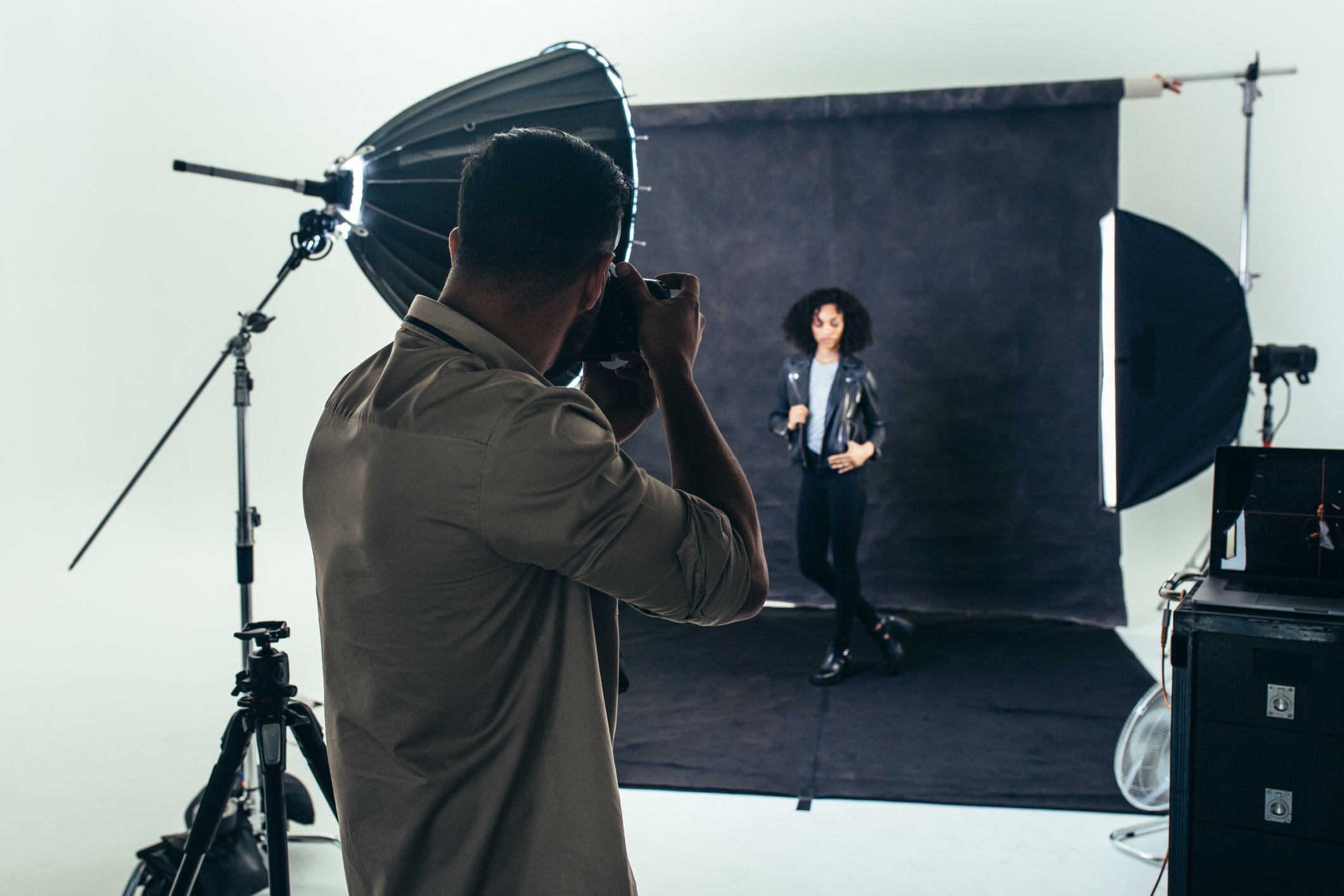
photo by jacoblund via iStock
Starting your own photography business is rife with possibilities. When thinking about your future, it’s hard not to be full of excitement at the prospect of doing what you love and being your own boss at the same time.
But as you plan and prepare to open your business, it’s important not just to think long-term, but to also address common issues that cause businesses to fail.
According to Forbes, about 80 percent of small businesses make it through the first year. That might sound encouraging, but it’s a precipitous drop after that - about 50 percent of small business live to see five years and only 33 percent make it to ten years.
If you want to be one of the 33 percent that makes your business last, watch out for the following ways photography businesses fail.
Ways Photography Businesses Fail: No Protection for Your Gear
photo by clsgraphics via iStock
As a professional photographer, you have a ton of money invested in cameras, lenses, tripods, flashguns, and other necessities to get the job done.
Should a critical piece of equipment - your primary camera, for example - get damaged and is inoperable, your ability to work is obviously very limited.
What would limit you further is not having insurance to protect your gear in the event that something goes awry.
photo by anankkml via iStock
Though it isn’t fun to think about all the calamities that could occur to render your gear useless, it’s something to think about because things can and will happen.
A fire in your studio, an accidental drop of your lens on the sidewalk, or a stolen camera body can put the brakes on your work for days, if not weeks.
However, if you have a photography equipment insurance policy, you can quickly overcome these issues and get back to work.

photo by aleksandr yakovlev via iStock
For example, Athos Insurance Services has you covered for damage that occurs in a wide range of situations, including:
- Natural disasters like earthquakes
- Fire and smoke damage
- Flooding and water damage
- Lightning and wind damage
- Acts of terrorism
- Explosions
Their policy also covers more common situations - an accidental drop, lost or stolen gear, and gear that’s damaged in shipment. Policies start as low as $175.00 a year.

photo by pkujiahe via iStock
These coverages extend worldwide as well, so have peace of mind at home and abroad. Athos Insurance also offers replacement cost coverage, so your gear will be replaced with brand-new or like-kind items.
When your livelihood is your gear, it’s unacceptable to go without insurance for it. Head over to Athos Insurance to learn more and to get a fast, free online quote.
Learn More:
Ways Photography Businesses Fail: Lack of Financial Focus

photo by Jirapong Manustrong via iStock
Consider this - roughly one-third of businesses make a profit, about another one-third break even, and the remaining one-third lose money.
There are plenty of reasons why so many businesses only break even or lose money, and one of them is lacking financial focus.
It’s imperative that you know where your money comes from and where it goes if you have any hope of being in the one-third of businesses that turn a profit.
If you aren’t much of a numbers person, hire one. The health of your business is too important not to!
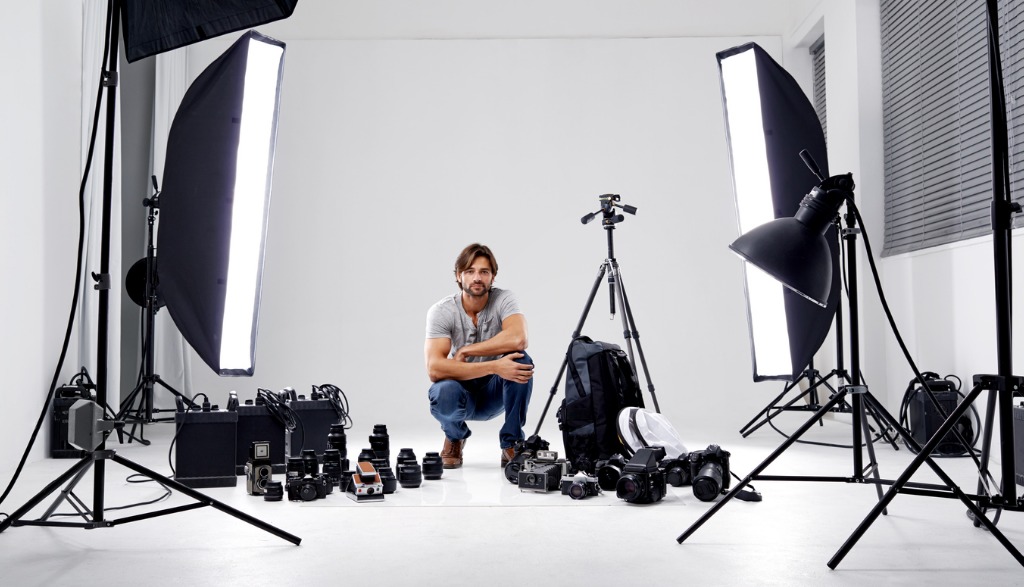
photo by PeopleImages via iStock
Likewise, some photographers mistakenly believe that investing in a ton of expensive photography gear is worth it. It’s not.
When you’re just starting out, the last thing you need to do is go out and spend $5,000 on a new camera body when the one you have is perfectly fine.
There are other more important things to spend your money on - paying an accountant, creating a rainy day fund, and investing in targeted marketing to draw in clients, to name but a few.
Keeping a close eye on your finances and making smart investments for the future is a great way to ensure your business is open for the long-term.
Learn More:
Ways Photography Businesses Fail: You Don’t Stand Out

photo by jacoblund via iStock
Make no mistake - there is tremendous demand for professional photography services.
The problem is that there are also a lot of professional photographers offering those in-demand services, so competition for clients is robust.
Additionally, though many photographers are extremely talented, they might find that their business is just breaking even or even failing because they don’t stand out in the sea of other photographers.
In other words, why should a client hire you instead of one of the other dozen photographers in the area that offer the same products and services for roughly the same price?

photo by trumzz via iStock
The solution to this problem is simple: determine how you can set yourself apart from everyone else and make that the centerpiece of your marketing.
Branding is certainly part of this equation. You need a business name, a logo, a tagline, and consistent colors and fonts in your marketing materials that help people identify you and your business.
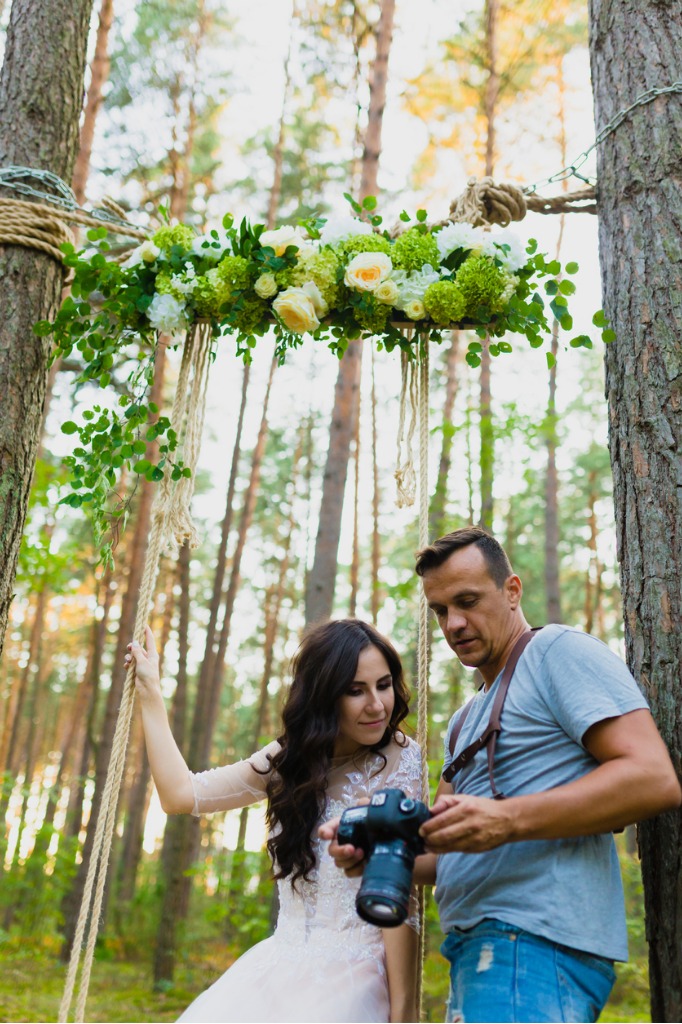
photo by meatbull via iStock
Likewise, you need to develop services or photography packages that are high-value and unique. For example, you might waive the sitting fee for engagement photos if the clients book you for their wedding too.
The point here is that to stand out, you need to have a customized approach to marketing that captures the attention of clients, and to back that up, you need to have products and services that are attractive and valuable.
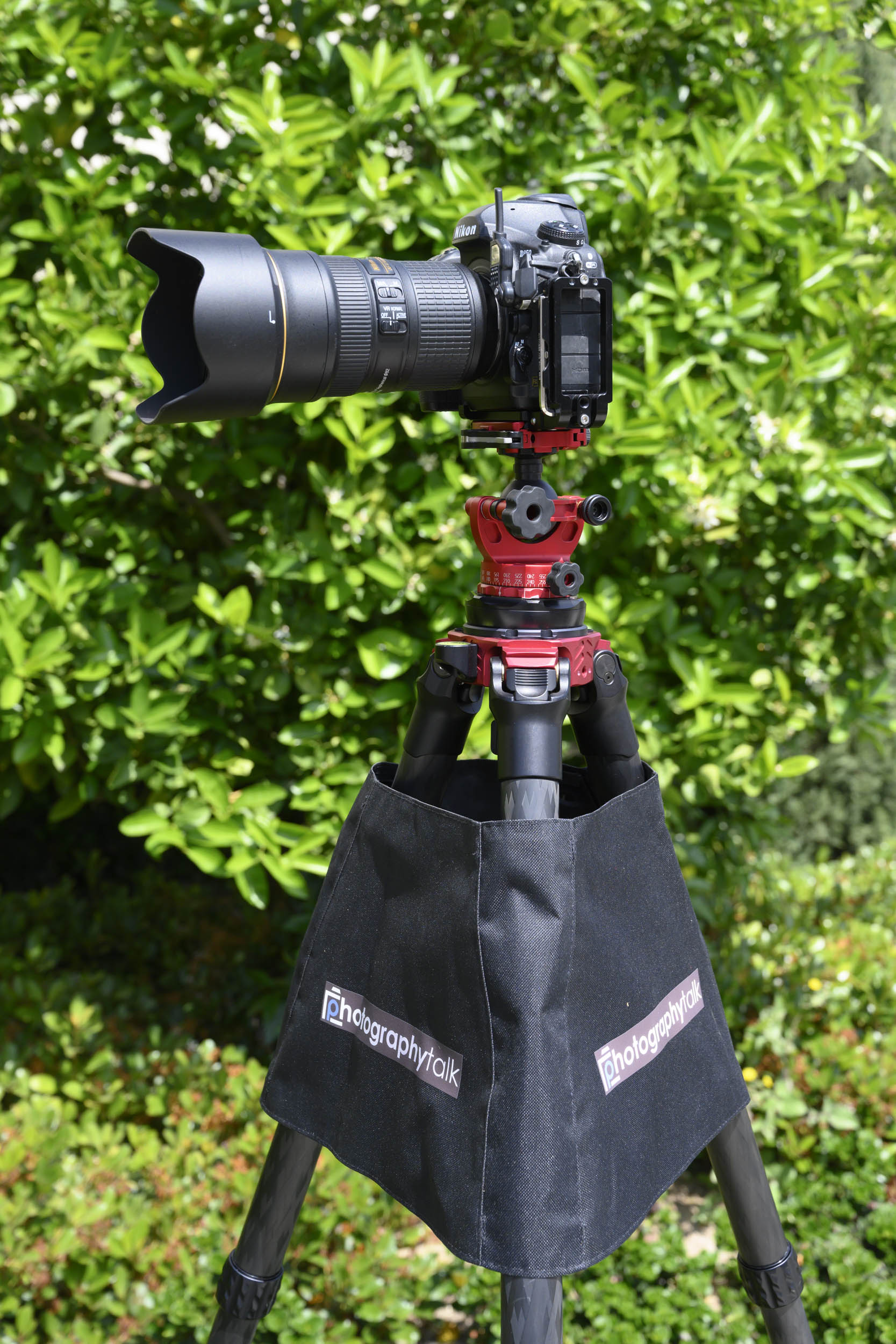
Likewise, having unique marketing materials will help you grab the attention of potential clients more readily than the same old social media posts and advertisements.
One genius product that can help you stand out from the crowd is Tripod Flags.
Emblazoned with your company name, your logo, your contact information or a combination thereof, Tripod Flags is an ideal marketing tool that uses a highly visible area to let people know who you are.
The heavy-duty canvas is strong and durable, so you get years and years of performance out of them. They also look great!
You literally don't have to do a thing to promote yourself with Tripod Flags, other than set up your tripod and add your flag. Marketing your business doesn't get much easier than that.
Learn More:
- How to Be a Successful Photographer: 3 Tips You Need to Know
- Critical Photography Business Tips for 2019
Bonus Tip: Prevent Business Failure With a Reliable Website
As a photographer, you have to have a solid online presence.
Sure, social media is important, but you also need a website where you have a portfolio of images that you can show potential clients and convince them that you're the photographer for the job.
Of course, if your website is constantly down because you have unreliable hosting, it'll be difficult to show people the kind of work you do...
Back in the day when PhotographyTalk was just starting, I had all sorts of issues with our hosting company. In short, the website was down all the time.
That's just not a recipe for success, which is why I tried many different hosting companies, some good, some bad, and some just plain ugly.
Then I found OVH...
OVH has been our hosting company for going on four years, and it's been a match made in heaven.
To say that they provide reliable service is an understatement - they promise 99.9 percent uptime, and they have absolutely delivered on that promise thus far. I'm sure you'll find the same to be true!
 Photo by gorodenkoff via iStock
Photo by gorodenkoff via iStock
Failing in business is an all-too-common occurrence, and if you want to keep failure at bay, you've got to develop relationships with other companies that can help you achieve your goals.
In the case of OVH, they're a global company with tens of thousands of customers, but when you interact with their customer service team, you feel like you're their most important client.
That kind of service shouldn't go unnoticed, especially in today's world of robo calls and automated "help" lines.
Truly, if you want your business to flourish, don't neglect the little things like having reliable hosting so that your website is up and viewable to the world!
We Recommend
Beginner Photography Business Tips

photo by diego_cervo via iStock
So, you’ve decided to start a photography business. Awesome!
The question is, now what?
Deciding to start a business and doing it are two very different things. With these beginner photography business tips, you’ll learn a few essential steps you need to take to get the ball rolling
Let’s get to it!
Beginner Photography Business Tip #1: Get Photography Insurance

photo by Jirapong Manustrong via iStock
The first thing you need to do is protect your livelihood with proper insurance coverages. After all, you can’t exactly build a successful business if your gear is damaged, lost, or stolen with no means of recouping those losses.
Though insurance can be a confusing mystery to many people, Athos Insurance Services has made it easy for photographers to get the coverages they need.
photo by dusanpetkovic via iStock
You can hop on their website and get a fast, free quote for equipment coverage in a matter of minutes. You can also get coverage 24/7 via their website, so the process is painless, quick, and can be done when you have time.
Annual policies start as low as $175.00 a year for equipment coverage.
Once you’ve got your equipment policy, you can rest easy knowing that all kinds of calamities are covered. That includes:
- Fire and smoke damage to your gear
- Water damage to your gear
- Natural events like earthquakes, hailstorms, windstorms, and lightning that damages your gear
- Falling objects that damage your gear
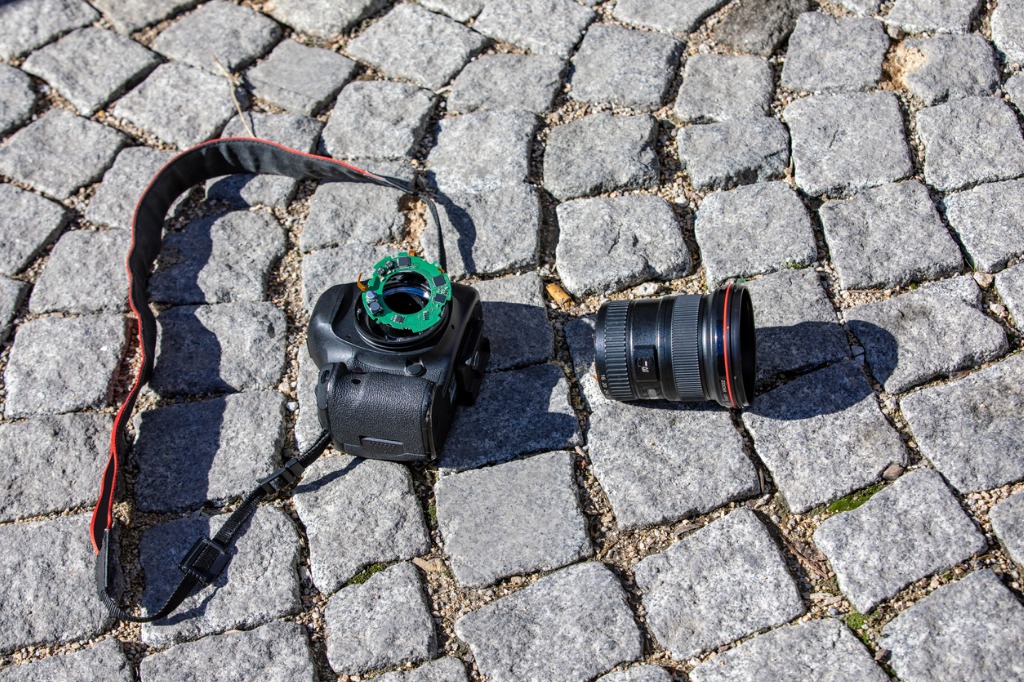
Additionally, this equipment policy covers your gear if it’s lost or damaged in transit or shipping. It’s worldwide coverage as well, so no matter if your gear is damaged in or near your home or halfway around the world, you can get replacement gear so you can keep working.
Having your gear insured is peace of mind that you can’t go without. That’s especially true because this is replacement cost coverage, so your gear is valued in today’s dollars. That means that if your camera was $1,000 five years ago, and a similar replacement costs $1,500 today, you get $1,500 to get a new camera. Nice!
Start your business off on the right foot and get insurance coverage now, rather than rolling the dice and hoping nothing happens to your equipment!
Learn More:
- How to Be a Successful Photographer: 3 Tips You Need to Know
- Mistakes That Could Doom Your Photography Business
Beginner Photography Business Tip #2: Market, Market, Market

You might be the very best photographer in your area, but if you don't have a solid marketing plan for reaching potential clients, your skills as a photographer won't matter!
There are all sorts of things you can do to market yourself that don't take much time, effort or money.
Social media comes immediately to mind. Consistent posts that have value for your clients and potential clients can go a long way in helping you establish yourself as an authority in your particular type of photography.

Making use of YouTube is another marketing strategy that can really pay off. Not only is video one of the most important marketing tools in your toolkit, but you can monetize your YouTube channel and perhaps make some nice money on the side.

Another thing you should be doing is taking advantage of every opportunity to put your name and contact information in front of people.
Say, for example, you're shooting a wedding. Well, you'll be front and center much of the time, so using your gear as a place to advertise your business is a no-brainer.
With a Tripod Flag (shown above), you can do just that. Have your name, logo, and contact information added to the flag, and voila - you've got an instant billboard!
Best of all, these things look great, are easy to use, and will help advertise your business while you work. It's tough to beat that arrangement!
Beginner Photography Business Tip #3: Get Experience and Build a Portfolio

Photo by Joshua Rawson-Harris on Unsplash
Like any new business, you need to build some credibility before things can really take off. That means getting experience whenever and however you can so you have work samples to put in a portfolio that can help you generate future business.
In the beginning, friends, family, and acquaintances are perhaps your best bet for getting some photography gigs. Even if it’s something as simple as photographing your baby cousin’s first birthday, it’s an opportunity to flex your photography muscles and create images that will impress future clients.

Photo by Osama Saeed on Unsplash
It’s important not to be picky here - work is work, even if you get paid little or nothing to do it.
Though many in this industry warn against working for free, you have to understand that even if you work for free now, it’s an investment in your future business. The photos you take for a friend without payment could very well be what impresses a future client to sign on with you instead of a competitor!
A word to the wise: only put your very best work in your portfolio. It should be a curated collection of images, not an overwhelming collection of every photo you’ve ever taken. Less is more - 10 incredible shots will be more effective than 30 so-so ones.
Beginner Photography Business Tip #4: Get a Reliable Website Host
Of course, you can't exactly have a website if you don't have a hosting service.
Actually, to be more specific, you can't have a photography website without a reliable hosting service.
Over the last 20 years, I've used a number of different hosting companies - some good and some bad.
For the last three years, PhotographyTalk has used OVH for our hosting needs. OVH is definitely in a class of its own.

Finally, my company has hosting that's reliable to a tune of true 99.9% uptime. That's not a sales pitch or an empty promise - OVH really does perform that well!
That's thanks to their global scale of operations - four continents, 19 countries, 27 data centers, and 300,000 servers, to be exact.
But more impressive than OVH's infrastructure is the fact that despite being a global company, they put customer service first.
If you've ever felt like you're just a number to big companies you work with, you know how valuable it is to find reliable partners that think of you as more than just another customer.
If you're ready to build your photography business, start the process by getting your online presence built today.
Get the right hosting so you can show your photos to the world today!
Beginner Photography Business Tip #5: Build Bridges With Other Photographers

Sure, photography is a highly competitive business, but most of us are just one-man-bands trying to make it. That means that from time to time, we’ll need help from our fellow compatriots in the industry.
By building bridges with other photographers in your area, you can actually benefit your business and theirs.
Think about it - if you let a competitor borrow one of your cameras or lenses for the weekend, you’ll have a colleague for life (and someone that will loan you gear when you need it too).
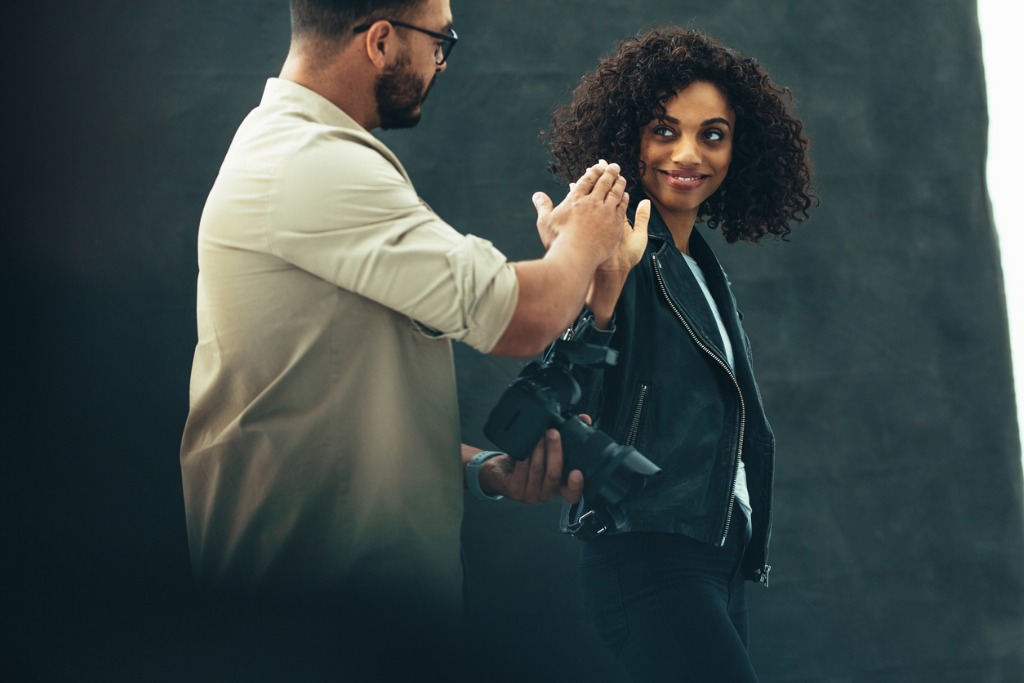
photo by jacoblund via iStock
Likewise, you can get more business by working with other photographers. For example, if a colleague in town is booked solid and simply can’t accommodate a new client, they might call you to see if you’re available.
The point is that though you’re competing in the same industry, making friends out of other pros in your area will only be mutually beneficial as you both strive to build something successful.
Besides, other photographers are great assets to have when you need advice, need to complain, or need a shoulder to cry on.
Learn More:
- Photography Business Tip: How to Strike a Better Balance Between Work and Life
- How to Insure Your Photography Gear
Beginner Photography Business Tip #6: Take Every Opportunity to Network

photo by gremlin via iStock
Building off the previous two tips, it’s important that you devote a lot of time to getting out there, pounding the pavement, and helping people put a face to your name.
The more opportunities you take to shake hands, introduce yourself, hand out business cards, and interact with people in your area, the more likely you are to get phone calls and emails from potential clients.
Just because you open your doors and have a website and a phone number doesn’t mean that clients will be flocking to you to photograph their weddings and birthdays and other special events.

photo by gremlin via iStock
Instead, you need to network and build relationships in the community, that way when someone needs photography services, they’ll remember you from the line at the coffee shop or the photo booth at the fair or the church picnic.
There’s certainly a place for online marketing and a there’s a huge need for it too. But Facebook, Instagram, and your website simply don’t have the same impact on people as a face-to-face meeting does.
So, get out there, start introducing yourself, and make connections so you can build a solid, long-lasting photography business!
We Recommend
Best Photography Insurance Companies of 2018

Here we are at the end of 2018, and hopefully you and your business made it through the year without any catastrophes.
But if you experienced some trouble along the way - a broken camera, a lost lens, or getting sued by an angry client - you know the value of having good photography insurance to have your back.
If you don't have photographer's insurance, you're playing a very dangerous game. All it takes is for one major event to go wrong, and you could end up losing your business!
In 2019, make sure your business is protected with coverages from one of the best photography insurance companies.
Athos Insurance Services
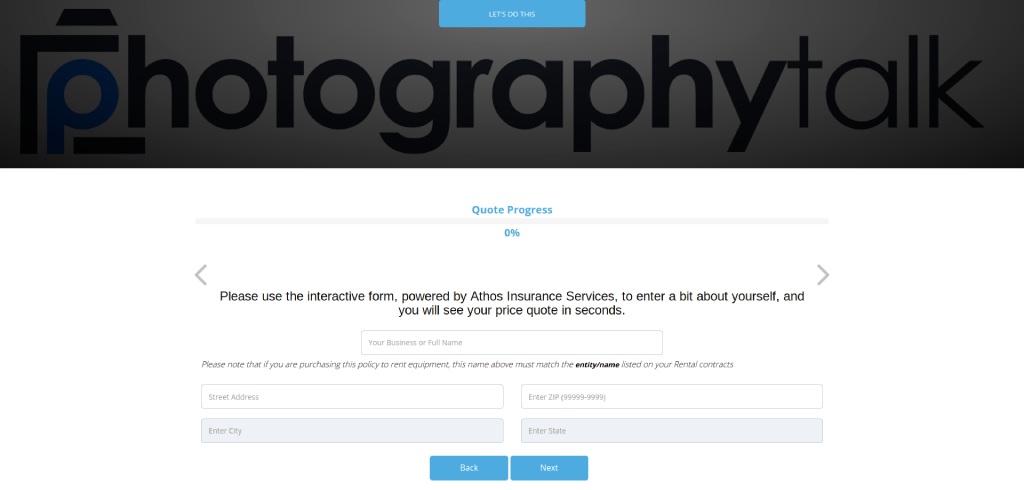
Only one photography insurance company can be at the top of our list, and that company is Athos Insurance Services.
There’s a lot of reasons why Athos Insurance is our top choice, but chief among them is their dedication to customer service.

If you’ve spent any time working with big insurance companies, you know the feeling of being lost and confused and treated like just a number. With Athos Insurance, however, your needs are put first, and you genuinely feel as though you’re the #1 priority. That doesn’t occur much these days!
Another factor in this ranking is the sheer breadth and depth of the coverages that Athos Insurance offers. Coverage for your gear through their Inland Marine (equipment floater) product is available online 24/7. They are also working on a General Liability product specifically for photographers coming in early 2019!
When it comes to covering your gear, accidental damage and theft is always included. Also, damage that results from lightning and wind, hail, flood, fire, smoke, and water is covered too. Heck, even damage resulting from earthquakes and explosions are covered as well.
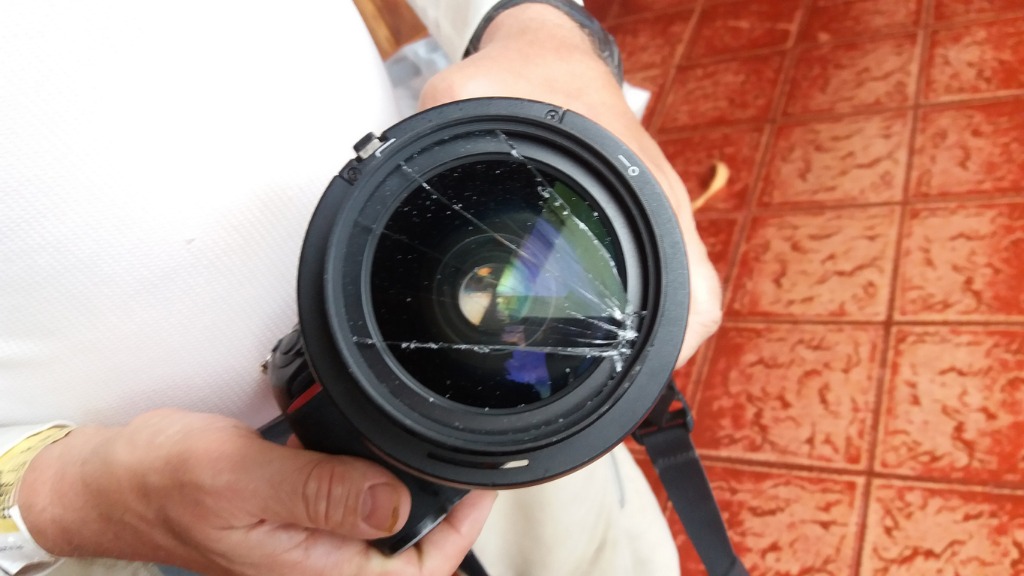
Though you hope that you don’t have to go through catastrophes, it’s nice to know that your photography insurance company has your back with replacement cost coverage just in case. Better still, events like damage during transit or shipping are covered too. Athos automatically included worldwide equipment coverage.
Athos Insurance makes the process of getting insured as streamlined as possible. In fact, you can get a fast online quote in short order, purchase your coverage online, and customize your coverage quickly and easily 24 hours a day, seven days a week. For a photographer that’s got little time to spare, being able to get the insurance you need without spending a lot of time doing it is a Godsend!
That's just a few reasons why we recommend Athos Insurance Services. See for yourself why they're our top choice!
Learn more about Athos Insurance Services
PackageChoice

PackageChoice offers comprehensive coverage for photographers that combines a number of essential coverages into a single program.
That includes Errors & Omissions Insurance, which is designed to protect you should you be sued as a result of allegations of negligence or wrongdoing on your part or the part of one of your employees. This program not only covers your legal fees but also pays for damages to the plaintiff if they are awarded a monetary sum.

PackageChoice also offers Camera Insurance that extends from gear that’s in your possession to gear that’s in transit or on location. What’s more, this coverage protects you whenever and wherever your gear might be damaged, lost, or stolen within the U.S. and Canada. International coverage can be added as well.
What’s nice about PackageChoice is that their camera coverage is paid at replacement cost - damaged or stolen equipment is replaced at the current cost, not what you originally paid for it. Generally a modest limit of rented equipment insurance is automatically included in the policy so that you won’t pay the rental house premiums when renting gear. When you require that Certificate of Insurance for your camera rental house (or venue) rest assured it will be taken care of expeditiously - PackageChoice issues thousands of them every year.
If you suffer that unfortunate claim that lands your camera or lens at the repair shop for five weeks, in many cases PackageChoice will reimburse you for the cost of renting a temporary substitute. Often its included automatically but be sure to discuss this important option with a PackageChoice insurance expert at 866-977-4725.
Of course, getting photography insurance isn’t just about the types of coverage available, but it’s also about the price.

PackageChoice offers affordable policies with multiple payment plans available, that way you can tailor your payments to your cash flow. Whatever your needs, PackageChoice can help you customize your coverage so you have maximum protection.
With underwriting from many different large insurance companies including The Hartford, CNA, and Travelers Insurance, you have a wealth of size, experience, stability and knowledge to rely on. Combined with the ease with which you can get coverage - just fill out a quick online application and a free, no-obligation quote will arrive soon - you have the makings of a top photography insurance company!
Learn more about Package Choice Photography Insurance
National Photographer's Insurance
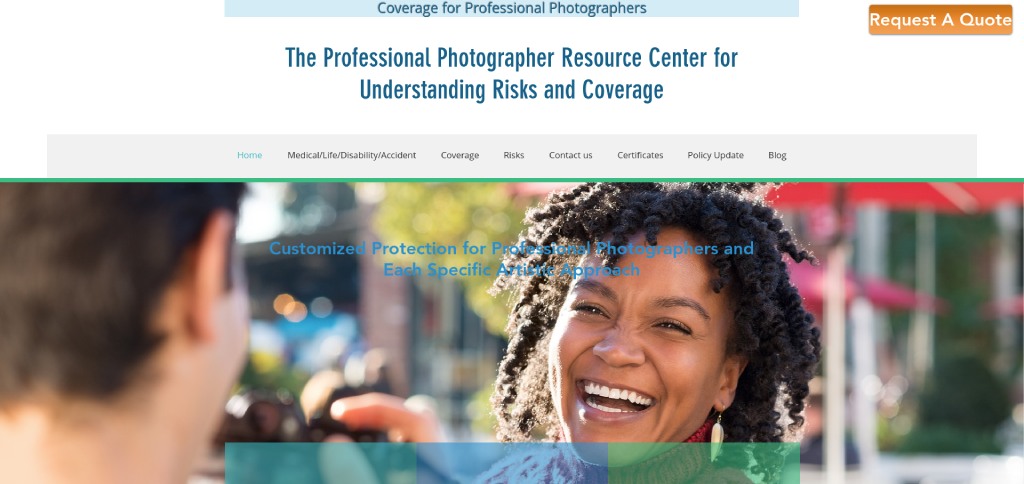
Another solid option for photography insurance is National Photographer's Insurance.
These guys have been in business for over eight decades and have a proven track record of top-notch customer service and excellent coverage options.
What makes this company such a great choice for photographers is that it exists to specifically serve the needs of the photography industry.
That means that they have the specialized knowledge and understanding of this line of work that allows them to create customized coverages just for you.
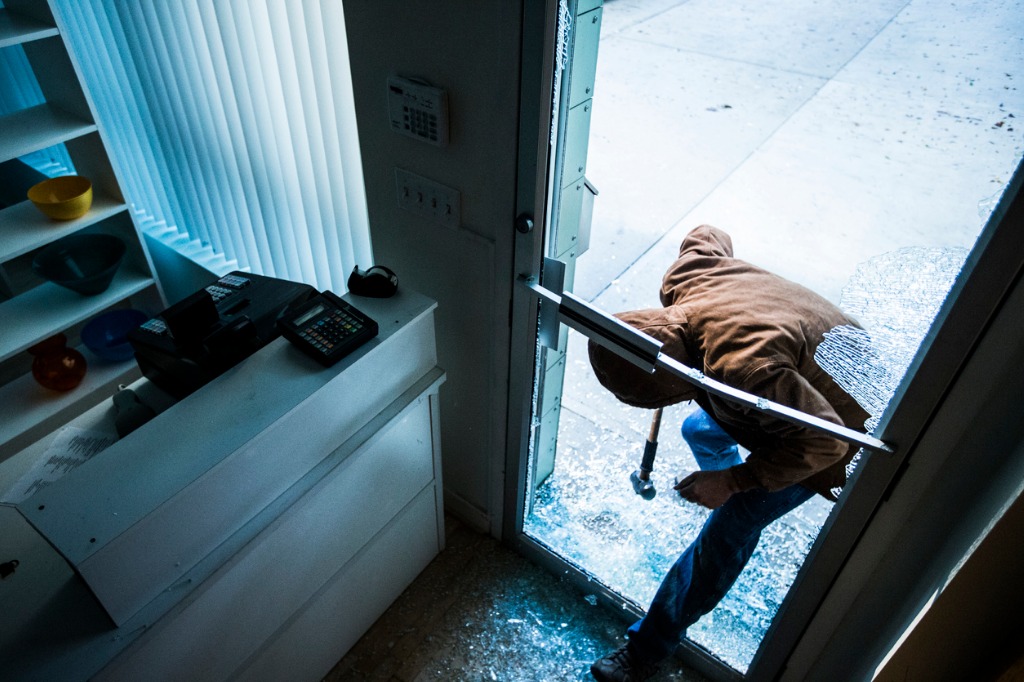
As a result, National Photographer's Insurance has a host of coverages that any photographer will appreciate.
That includes business personal property coverage to protect you in the event someone breaks into your studio and steals your gear.
That also includes general liability coverage that protects you if you're sued as a result of a client slipping and falling on your property.
Other policies address common occurrences for photographers, including equipment coverage for damage to your gear when on-location and professional liability protection to cover instances of professional errors, neglect, or omissions. Additionally, they have a business income and extra expense coverage option that provides up to 12 months of coverage for lost income as a result of fire, flooding, or other covered losses that forces you to close your doors.
In other words, National Photographer's Insurance offers comprehensive coverage that gives you peace of mind and protects you when things don't go quite as planned!
Learn More About National Photographer's Insurance
NEXT Insurance

For NEXT Insurance, your coverage should be easy to get, customized to your needs, and affordable.
With that approach, it's no wonder they land on our list of the best photography insurance companies of the year.
Not only can you buy your policy 100-percent online, but NEXT Insurance offers various payment plans that make it easy to keep your cash flow going. Better still, plans start at as little as $21 per month. Talk about affordable!

All plans include general liability coverage that protects you in the event that a client is injured and sues you and if you accidentally damage someone's property during a photo shoot.
Additionally, NEXT Insurance offers coverage against advertising claims. So, if you have permission to share the photos you took of a client for advertising purposes, but they don't like the photo you shared and then sue you, you're covered.
NEXT Insurance really has thought of it all. Great coverage. A simple, easy process for buying a policy. Affordable prices. You can't beat that!
Learn more about NEXT Insurance
Hiscox Insurance Company
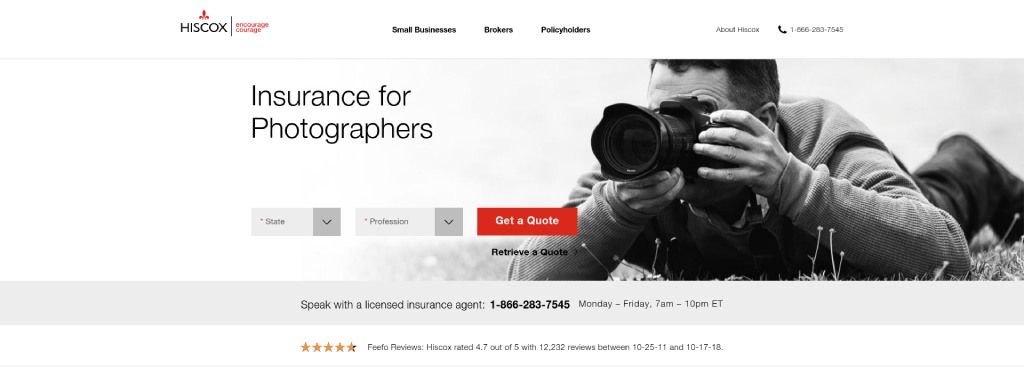
Rounding out our list of the best photography insurance companies of 2018 is Hiscox Insurance.
With origins that date all the way back to 1901, Hiscox has built a reputation as one of the leading specialist insurance companies in the country.
Since they target specific types of insurance for specific industries like photography, they have unparalleled expertise in helping you find the right coverage for your specific needs.

Among their numerous types of coverage are general liability, professional liability, and property insurance, each of which can be obtained through brokers or directly online.
General liability insurance covers you in case you or your equipment cause someone bodily harm or property damage. It also covers you against libel and defamation claims from clients.
Professional liability coverage from Hiscox covers you in a number of different situations, from having an dissatisfied client that sues you to having gear that fails and prevents you from delivering on your contract obligations.
Finally, Hiscox offers business owner's insurance for photographers that helps balance coverage for your small business while also protecting your business equipment.
Like the other companies on our list, Hiscox really has thought of it all, and with their dedication to putting the customer first, they're a great choice for your photography insurance needs.
Learn more about Hiscox Insurance
We Recommend
Best Photography Insurance Companies of 2019/2020
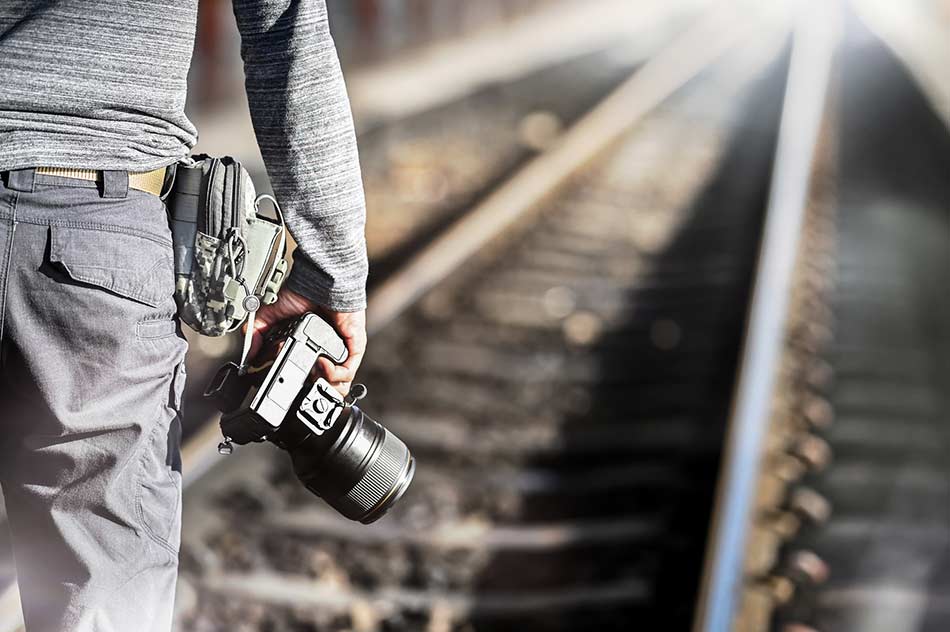
photo byPrathanChorruangsak via iStock
Though buying photography insurance might not be as exciting as buying a new camera or a new lens, it’s nonetheless a critical component of building a successful photography business.
Lost or damaged gear, a break-in at your studio, fires and floods, or lawsuits from clients can easily derail your business for the short-term, if not for the long-term. The financial consequences could prove to be disastrous, so much so that your doors remain permanently closed.
But with the right photography insurance coverage, you can account for unexpected events and calamities, and often do so quickly and easily online.
And, if you work with one of our picks for the best photography insurance companies, you can find coverage at a price you can afford!
Table of Contents
- Full Frame Insurance
- Package Choice Insurance
- Athos Insurance Services
- Next Insurance
- National Photographer’s Insurance
Best Photography Insurance Companies: Full Frame Insurance

What people love about Full Frame Insurance is that they offer flexible options to meet your specific photography insurance needs.
Let’s say you just need short-term insurance to cover your first event or photoshoot. In that case, Full Frame Insurance has you covered with short-term general liability insurance that gives you one to three days of consecutive coverage, starting at just $59.
That’s a small price to pay to have photography insurance while you get your first gig under your belt!

photo by sukanya sitthikongsak via iStock
But if you’re a seasoned pro with more robust insurance needs, Full Frame Insurance offers annual policies as well. These annual policies are ideal for photographers that need general liability coverage alongside their product liability coverage.
Either way, you can configure the short-term or annual coverage you need to match your specific situation. You can also add equipment insurance if needed, that way your expensive photography gear is covered too—it doesn’t matter if you’re at home, abroad, or in transit.
No matter what kind of coverage you select, Full Frame offers an instant online quote with an option to purchase right there and then. You get instant coverage that is not location-specific, 24/7 access to policy documents, a downloadable certificate of insurance, and no deductible on liability claims.

photo by simonkr via iStock
Full Frame Insurance understands the kinds of exposures that exist for small business owners, which is why they offer protection from third-party liability claims like property damage or bodily injury. Their policies may also help address third-party medical claims or legal fees that arise from covered claims.
Full Frame also offers specialized wedding photography insurance. With this policy, you can address the potential for liability as you photograph hundreds of people in multiple locations over the course of a demanding day.
Of course, affordability is a concern, and Full Frame Insurance understands that. As a result, their policy has customizable options that ensure you don’t overpay for the coverage you need. It’s that kind of dedication to the customer that got Full Frame Insurance on our list of the Best Photography Companies of 2019 & 2020!
Learn more about Full Frame Insurance
Best Photography Insurance Companies: Package Choice Insurance

photo by demaerre via iStock
If you’re looking for comprehensive coverage for your photography business, Package Choice Insurance is definitely worth a look.
For starters, they offer a camera insurance policy that covers your gear whether it’s in your possession, on location, or in transit from Point A to Point B. For photographers that are constantly on the road, that’s the kind of peace of mind you want!
Furthermore, their camera insurance policy protects your gear wherever it might be damaged in the United States or Canada. The policy also covers theft and lost gear, and international coverage can be added to protect you when you’re abroad.
This coverage is paid at replacement cost as well. That means that gear that’s stolen or damaged is replaced at today’s value, not what you paid for it two or three years ago. Likewise, Package Choice usually includes a modest limit of rented equipment insurance so you don’t have to pay the full price to rent the gear you need while yours is being replaced.

photo by yipengge via iStock
If your gear is damaged and ends up in the repair shop for weeks on end, Package Choice will often reimburse you for the cost of renting substitute gear. This is typically an automatic inclusion in the policy, but it’s important to consult with a Package Choice insurance expert to get the specifics.
You can also get Errors & Omissions insurance, which is specifically designed to protect you in the event you’re sued by a client. Whether you or one of your employees is accused of wrongdoing or negligence, this policy will cover your legal fees and pay damages to the plaintiff should they be awarded a monetary sum.
The other benefit of getting your insurance from Package Choice is the price.

photo by skynesher via iStock
The folks at Package Choice understand that starting and maintaining a successful business takes a lot of hard work, dedication, and money, so their policies are designed to be affordable. Heck, they even have multiple payment plans available to help you meet your insurance needs without breaking the bank.
Package Choice has underwriting from insurance companies like CNA, Travelers Insurance, and The Hartford, so there is a vast breadth and depth of experience, knowledge, and stability on which you can rely. All you have to do to get started is to fill out a short online application, and you’ll get a free, no-obligation quote soon thereafter!
With policies for computers and electronic devices, business personal property, general liability, and various other coverages, Package Choice has all your bases covered so you can concentrate on growing your business without worry of what will happen if disaster strikes.
Learn more about Package Choice Photography Insurance
Best Photography Insurance Companies: Athos Insurance Services

Athos Insurance Services makes our list of the best photography insurance companies of 2019/2020 due in large part to the wide range of coverages they offer.
Regarding your gear, you can get coverage for all sorts of maladies, from flood and fire damage to water and smoke damage to wind, hail, and lightning damage. Natural disasters, acts of terrorism, falling objects, theft, and accidental damages are also covered!
What’s more, Athos Insurance Services will cover your gear for damage during transit or shipping, and they offer an Inland Marine (equipment floater) policy too! All of this coverage is worldwide in scope, so no matter if you’re at home, across town, or around the globe, your gear is protected.

photo by undefined undefined via iStock
Add to that policies for short-term rented equipment, annual production equipment, and annual photography equipment, and you have coverage for all sorts of gear-related scenarios you might encounter.
And getting all these coverages is easy, too. Just hop online, fill out a form, and get a fast online quote in a snap. You can even purchase your coverage online and customize it to your needs 24 hours a day, seven days a week.
Perhaps best of all, Athos Insurance Services has five-star customer service, which is a big deal when you’re shopping for insurance.
Instead of feeling like just one of many clients, Athos Insurance Services ensures that you feel like you’re their top priority. If you have questions or concerns, they’ll work hard to ensure that you have all the details you need to make an informed decision that’s right for your particular needs.
Learn more about Athos Insurance Services
Best Photography Insurance Companies: Next Insurance

One of the primary reasons why Next Insurance makes this list is because they have made it so simple for photographers to get the coverage they need.
Not only can you get the policy you want online, but you can also get live certificates of insurance and file claims on your schedule online 24/7. Talk about convenient!
Next Insurance has also made sure that their plans are affordable for any photographer. Their plans start at just $21 per month, which is a small price to pay for complete peace of mind.

photo by Delmaine Donson via iStock
The plans offered by Next Insurance include general liability insurance with at least $500,000 occurrence limits and $500,000 aggregate limits - with a $0 deductible. Other plans increase those limits to as much as $1,000,000 per occurrence and $2,000,000 aggregate, again, with a $0 deductible.
General liability insurance from Next Insurance is vital because it protects you in case a client suffers an injury that’s your fault or you accidentally damage a client’s property. You already have enough to worry about - you don't need to worry about being sued too!

photo by scyther5 via iStock
You can also get coverage against advertising claims. For example, if you have permission from a client to use their photos as part of your marketing, but they don’t like the photo you selected to use and they sue you, you’re covered!
Soon, Next Insurance will also have photography equipment protection as well.
Easy-to-get coverage, great prices, and the policies you need...what more could you want?!
Learn more about Next Insurance
Best Photography Insurance Companies: National Photographer’s Insurance

Yet another excellent choice for your photography insurance needs is National Photographer’s Insurance.
As you might surmise from their name, National Photographer’s Insurance specializes in meeting the insurance needs of photographers. That means they have the industry know-how that helps them understand exactly what the best policies and coverages are for photographers like you.
As a result, they have one of the most comprehensive collections of policies around…
That includes general liability coverage that offers protection from lawsuits, like a client that’s injured in your studio. Likewise, you can get business personal property coverage that protects you in the event that there’s a break-in at your office and someone absconds with your photography gear.

photo by choochart choochaikupt via iStock
You can add a policy for equipment coverage to protect against loss from damaged gear as well as a professional liability policy that covers any professional errors, omissions, or neglect on your part.
There’s even business income and extra expense coverage to help you get through up to 12 months of lost income as a result of flooding, fire, or another covered loss that forces you to close up shop for an extended period of time.
With more than 80 years in the business, National Photographer’s Insurance knows what you need, which is why they have such comprehensive coverage offerings. Their proven track record of excellent customer service and professionalism make them an excellent choice for your photography insurance needs.
Learn more about National Photographer's Insurance
We Recommend
Critical Photography Business Tips for 2019

Photo by LightFieldStudios via iStock
With 2019 fast approaching, now is the time to sit down and outline the things you need to do to take your photography business to the next level.
But as you undoubtedly know, building and managing a photography business involves a lot of moving parts. The question is, which of those moving parts needs your focus the most?
In this quick business tutorial, I outline three must-have steps you need to take in the coming year to ensure your business is on the path to success.
Get Insured
Photo by Ivan Balvan via istock.
>If you’ve operated thus far without photographer’s insurance, you’re playing a very, very dangerous game.
It takes just one fire, flood, car accident, or theft to put you in a dicey situation if you don’t have insurance.
Though we all hope that issues like these don’t arise, they do, and quite often. You need proper coverage so you’re protected when - not if - something goes awry.
A must-have for your photography business in the new year is a comprehensive equipment insurance policy.
Athos Insurance Services offers just the kind of peace of mind you need whether you’re photographing in your hometown, another state, or worldwide. In fact, their policy is just what the doctor ordered because it covers an incredible list of eventualities, including:
- Accidental damage or theft
- Damage from wind, hail, or lightning
- Flood and water damage
- Fire and smoke damage
- Damage from earthquakes and falling objects
Athos Insurance Services even covers damage that occurs when your gear is in transit or shipping!

Photo by Francis Black via iStock
Better still, this policy offers replacement cost coverage, which means if your five-year-old camera is stolen, its value is based on the cost to replace it today, not on what its depreciated price might be.
When you work long hours and travel with your gear from one shoot location to the next, you have an increased risk that something might happen to your gear.
Don’t let 2019 be the year you regret not having your gear covered. Instead, get with Athos Insurance Services to get a free, fast online quote, and get the coverage you need!
Learn More:
- How to Insure Your Photography GearHow to Insure Your Photography Gear
- People You Need to Rely on as a Photographer
Get Good Hosting
An integral component of a modern photography business is having a gorgeous website, an online portfolio of your images, and perhaps even an online store.
But it isn't enough to simply have those things - they need to work and do so reliably if you're going to build a successful photography business.
Over my 20 years in this industry, I've partnered with more hosting companies than I care to admit - most of which were a nightmare to work with.
 Image Credit: scanrail via iStock
Image Credit: scanrail via iStock
Fortunately, I came across OVH several years ago, and I've never looked back.
Since switching PhotographyTalk to OVH, we've had excellent uptime - 99.9% just as OVH promises.
What I like about OVH (aside from their incredible reliability) is the fact that they're a global company with data centers and servers all over the globe.
In fact, they have 27 data centers and over 300,000 servers, so if anyone can ensure your company stays online, it's them.
You aren't just another number, though.
Sometimes, large companies have so many customers that you really are just one more in a long line of clients.
But despite being a global company, OVH works hard to ensure each and every customer feels like the most important customer.
Developing a successful is all about finding the best people to help you find success. In this case, OVH is precisely who you should partner with to realize your business goals.
Focus Your Marketing on a Local Level

Part of your marketing strategy should be to use tools like Facebook, Instagram, Twitter, and your website to promote your work and attract new clients.
But if that’s all you’re doing, you’re missing the boat…
Editor's Tip: Want the ultimate backup for your photos? Check out the new Synology DiskStation DS918+.
Old-school ways of marketing on a local level still have relevance in 2019. Whether that’s contacting other small businesses in the area to arrange referrals, joining the local Chamber of Commerce, or volunteering your time to help local charities, there is a wealth of opportunities for you to get your brand out there by focusing your marketing efforts in the “real world” and not just online.

So, instead of boosting that Facebook ad, why not try to come to a mutually beneficial arrangement with the local coffee shop owner. Perhaps in exchange for them displaying some of your photos in their shop, you take a few photos of their products for their website.
Likewise, instead of going to a national chain store to buy a new refrigerator, why not buy one from the local mom-and-pop store and build a relationship with them as a fellow small business owner? You never know when buying local might result in other business owners buying something from you - or referring their customers to you, for that matter!
Learn More:
Conduct a SWOT Analysis

The beginning of the new year is a perfect time to undertake a SWOT analysis in which you analyze your Strengths, Weaknesses, Opportunities, and Threats.
As you can surmise from the title, a SWOT analysis is all about identifying what you do well, what needs improvement, ways in which you can expand your business, and potential issues that threaten the health of your business.
When considering each of the four elements of the SWOT analysis, think about the following questions to ask yourself so you can develop a more detailed picture:
Strengths
- What are your unique talents or skills?
- What expertise do you have that no one else does?
- What areas of your business are most profitable?
Weaknesses
- What skills do you currently lack?
- What resources do you currently lack?
- What areas of your business are least profitable?
Opportunities
- How can you increase revenue without expanding your client base?
- What target markets have you not yet broken in with?
- What marketing tools could you be using to expand your reach?
Threats
- What do your competitors do better than you?
- What obstacles are standing in your way?
- How will economic trends impact your business this year?
Clearly, there are plenty more questions you can ask yourself in a SWOT analysis. However, the important thing is to get the process started of evaluating where you’re at and where you want to be. Get more details about conducting a SWOT analysis in the video above by Cate Costa.
Combined with having the right insurance coverage and enhancing your focus on local marketing efforts, doing a SWOT analysis can help you build a better business for 2019 and beyond!
Learn More:
We Recommend
Four Ugly Truths About Professional Photography

photo by jacoblundvia iStock
Being an independent, self-employed professional photographer is a dream for many people. And many people make a success out of that dream.
Many others don’t.
That isn’t meant to be a discouraging statement, but rather a bit of a warning. You can have all the talent in the world, all the skill of a savvy businessperson, and all the right gear, but without hard work, dedication, and smart decision-making, it could all go wrong very quickly.
With that in mind, here’s four ugly truths about being a professional photographer that you should keep in mind as you build your photography business.
Ugly Truths About Professional Photography: Your Business is Doomed Without Insurance
photo by golubovyvia iStock
When you’re starting out, there’s a lot of money output and perhaps not that much money coming in. As such, it can be tempting to cut corners on expenses.
Some photographers opt to go without proper insurance as a means of saving money, and those that do are in a Russian Roulette situation. A fire, flood, or damaged gear can spell disaster for a photographer that doesn’t have coverage for the equipment they need to work.
So while the ugly truth is that some photographers might view insurance as a luxury and not a necessity, the reality is that you absolutely need to have the proper insurance to protect your investment in your business.
photo by helovivia iStock
Don’t think that getting the right insurance is a long, drawn-out, and expensive process, either. For example, Athos Insurance Services offer photographers peace of mind with coverages that address a whole host of situations. They start at annual premiums of just $175.00 for equipment coverage.
For example, if you accidentally drop your camera and your lens is damaged, repair or replacement is covered.
As another example, if there’s a fire or flood in your office space and your gear is destroyed, that’s covered too.

photo by Wiyada Arunwaikit via iStock
Athos Insurance Services has coverages for natural occurrences like lightning, hail, and windstorms as well as manmade acts like terrorism.
If your gear is stolen, that’s covered too. Perhaps best of all, coverage extends worldwide so you have peace of mind that if something goes awry, you can get replacement gear and keep on working.
Speaking of replacement gear, the coverages offered by Athos Insurance Services are replacement cost. That means that your gear is valued in today’s dollars, not what you originally spent on it.

photo by PeopleImages via iStock
To top it all off, getting a quote and signing up for coverage couldn’t be easier. Just head over to the Athos Insurance Services website 24 hours a day, seven days a week, to get a fast online quote. If you like what you see, you can sign up for a policy right then and there.
You have enough to worry about starting your own business. Take some of that stress away by protecting your gear with the right insurance coverage!
Learn More:
- 3 Mistakes That Could Cause Your Photography Business to Fail
- Why Photography is a Financially Risky Business
Ugly Truths About Professional Photography: You'll Likely Not Charge Enough

photo by ielanumvia iStock
When you’re just starting out, you’ll almost certainly need to discount your prices just to get your foot in the door.
But once you’ve developed a reputation and have a good client base, you need to evaluate how you spend your time so you can charge an adequate amount.
The ugly truth here is that many photographers - particularly new ones - undervalue their services. More to the point, they undervalue their time.

photo by Doucefleur via iStock
Your fees can’t just be based on the time you spend actually taking photos. If you do that, you’ll find you don’t make any money at all.
Instead, examine how much time you spend on client-related activities each day - returning phone calls, emailing clients, processing images, placing orders, traveling to and from shoot locations, and so forth - and base your fees on that total time spent.
Again, though you might charge less initially just to get started, it’s imperative for your long-term success to develop a pricing strategy that accounts for all the time you spend on business activities.
Ugly Truths About Professional Photography: You Can't Be Everything to Everyone

photo by demaerre via iStock
The ugly truth about being a professional photographer is that, try as you might, you can’t be everything to everyone.
There’s a couple of dimensions to this…
First, though it might be tempting to try to be a “jack of all trades” kind of photographer, doing so can actually hurt your business.
After all, if you’re a fantastic portrait photographer, but a so-so sports photographer, you don’t want to waste your time taking sports photos. Doing so takes time away from what you’re good at, and your so-so sports photos could very well damage your reputation.
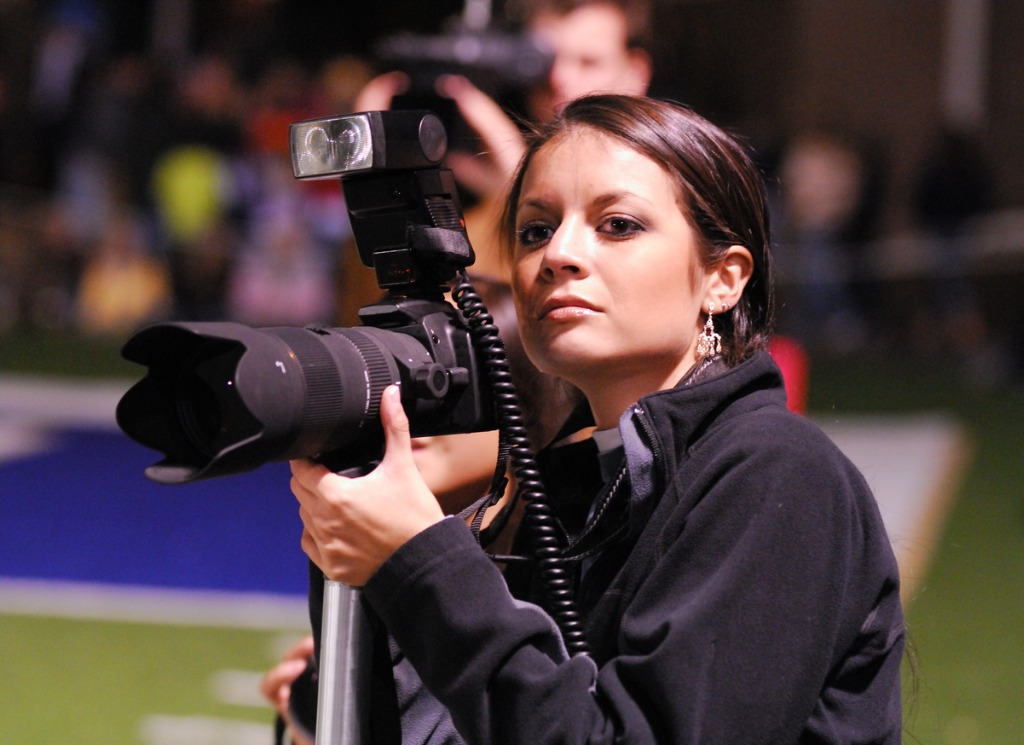
photo by dlewis33 via iStock
Secondly, it’s important to understand that you aren’t going to be able to please every single client.
Things will go wrong. There will be clients that are difficult to work with. People will badmouth you to their friends. You’ll get bad reviews on Yelp. It’s just the nature of the beast.
Of course, it’s imperative that you do your best and give each and every client top-notch service. When things go wrong, reach out, try to rectify the problem, and do what you can to please the client. But do so knowing that some people just can’t be pleased.
Learn More:
Ugly Truths About Professional Photography: It's Hard, Hard Work

photo by Slavica via iStock
Though photography might seem like a glamorous job in which you jet-set from one exotic photo shoot to the next, for the vast majority of photographers, that just isn’t the case.
Sure, many well-known photographers travel the world and have a herd of assistants to help them with day-to-day business activities.
But the ugly truth for most of us is that it’s all on us. We’re photographers, receptionists, bookkeepers, social media gurus, website designers, and so forth. You’ll wear many hats - some of which are for jobs you’re no good at - and that means you’ll put in a lot of hours over the course of the day, the night, and on weekends.
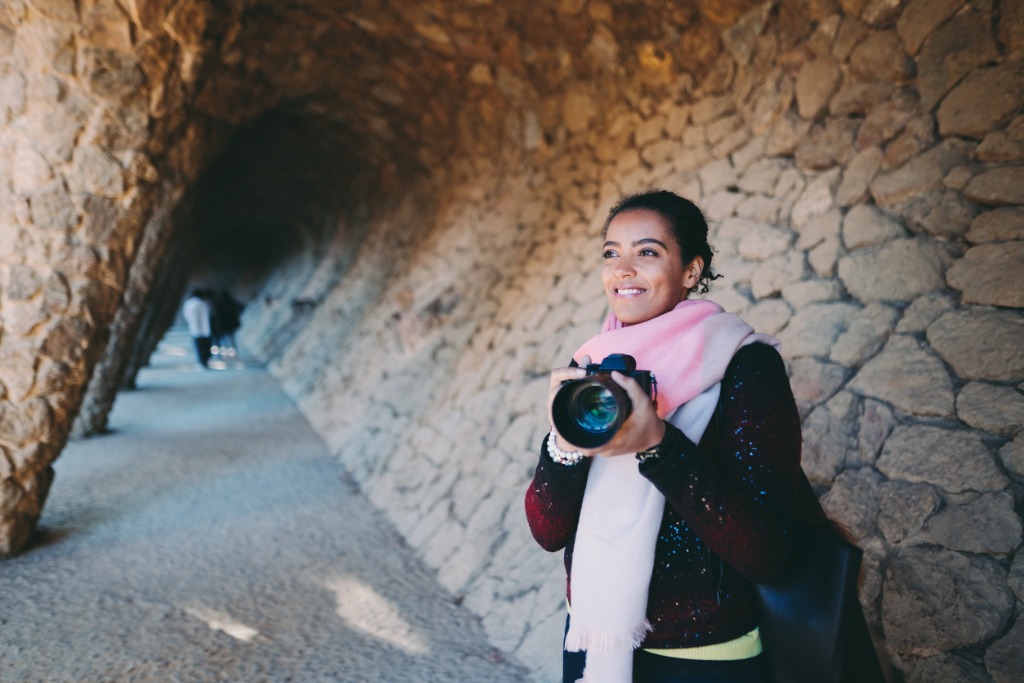
photo by martin-dm via iStock
Happily, through all that hard work, you can build something really successful and realize your dream of being a professional photographer.
Though there are many hurdles in the way, if you adhere to the advice I’ve outlined here, you’ll be on stronger footing than you otherwise would be.
We Recommend
How to Be a Successful Photographer: 3 Tips You Need to Know

Obviously there are way more than three things you need to know to be a successful photographer…
But a lot of the steps you need to take are well-known: you need the requisite photography gear, a website, have the talent and skill as a photographer, an office or studio space, a portfolio, and so forth.
There are some “hidden” photography business tips you need to be aware of as well. I say “hidden” because these tips are some of the most common things overlooked by new photographers, but these steps are equally as important to take as those listed above.
Let’s get started!
How to Be a Successful Photographer: You Need Insurance

Photo by Pattanaphong Khuankaew via iStock
I know a lot of you will read this and say to yourself, “Duh, of course I need insurance.”
However, I’ve come across more than my fair share of photographers over the years whohad no insurance for their business and didn’t understand why they needed it in the first place.
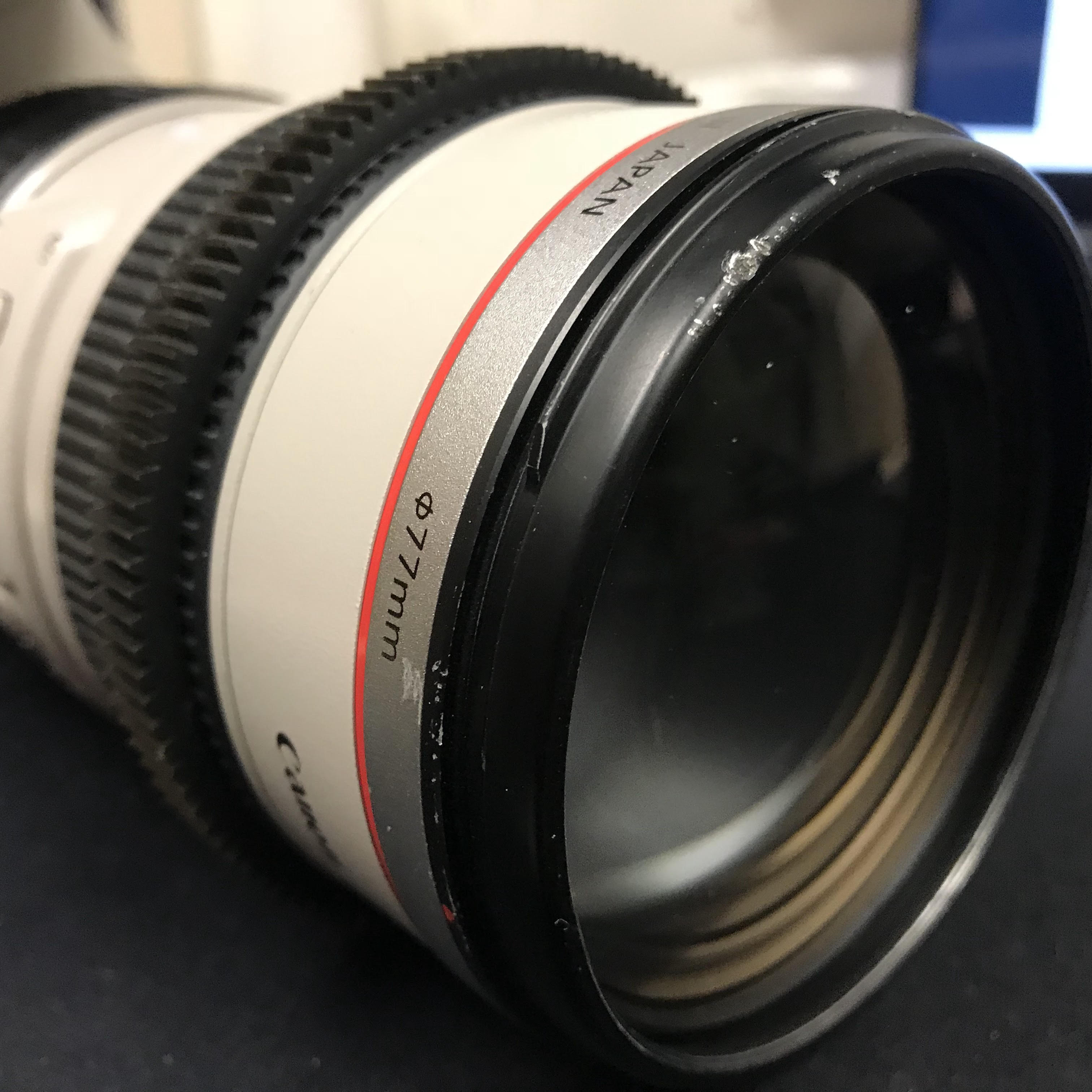
Fortunately, there are companies like Athos Insurance Services that offers an equipment policy that protects your photography gear in a wide range of situations.
For example, if there’s a fire in your office space and your computers are damaged, your equipment will be covered.
If you have an off-site gig and you need to ship some of your gear to the venue, but it gets lost during shipping, that’s covered too.
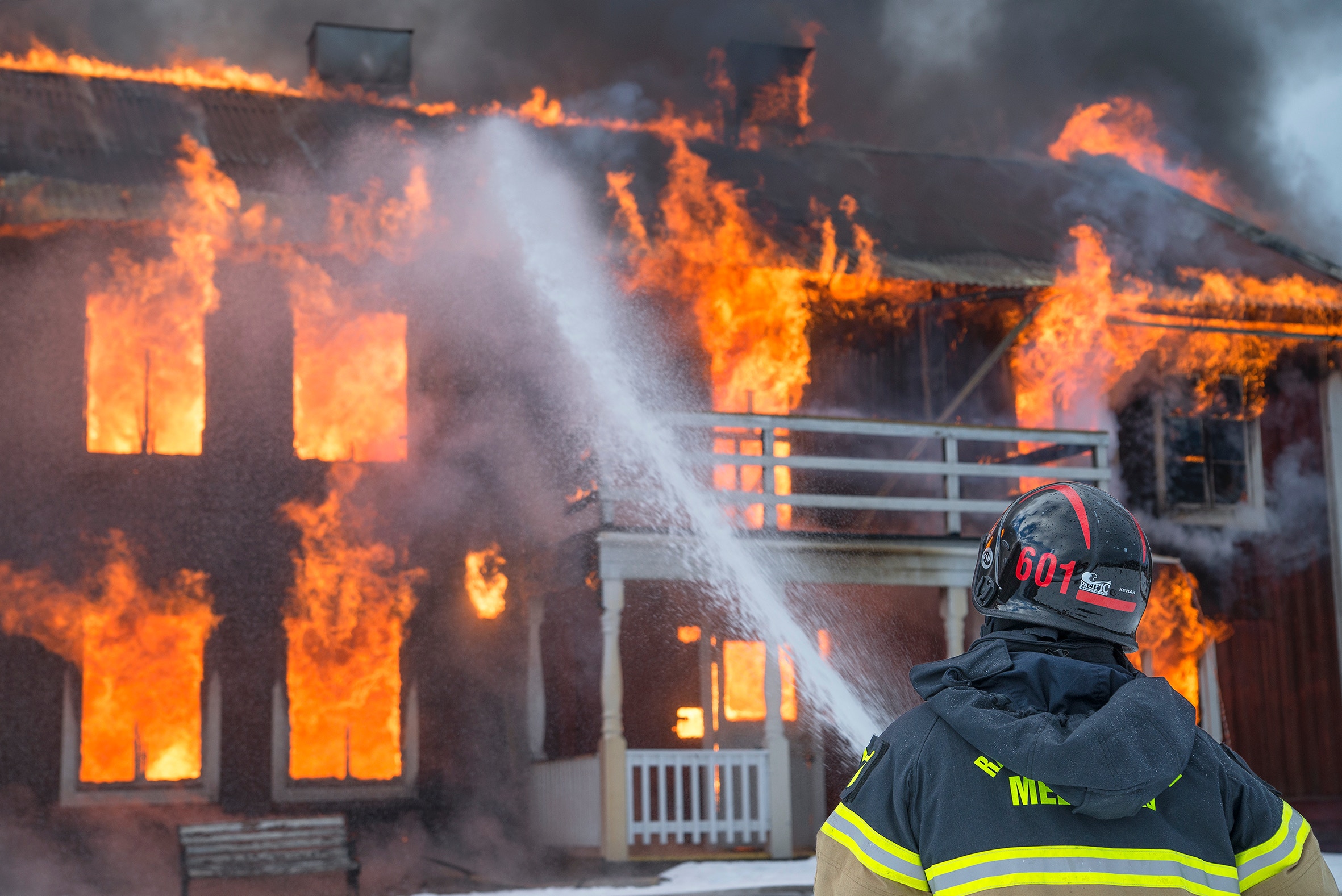
Photo by Daniel Tausis on Unsplash
Let me make this very clear - if your equipment is destroyed in a fire, your homeowner’s or renter’s policy will most likely not cover your photography gear because you use it to make money.
Your auto insurance may also not cover your gear if it’s stolen out of your car. Auto insurance is really meant to cover damage or theft of the vehicle itself, not its contents.
You get the point…there are too many things that can go wrong for you not to have photography insurance.
Don't have photography insurance? Protect your investment today to ensure a successful future.
Fortunately, there are companies like Athos Insurance Services that offers an equipment policy that protects your investment in your expensive photography gear in a wide range of situations.
For example, if there’s a fire in your office space and your computers are damaged, they’ll be covered.
If you have an off-site gig and you need to ship some of your gear to the venue, but it gets lost during shipping, that’s covered too.
Let’s say a natural disaster occurs - an earthquake or a wildfire, for example - and your office is totally destroyed. This policy ensures your gear is covered.
And that’s just the start!
Athos Insurance Services has worldwide coverage, so if you’re a jet-setting photographer, you can rest easy knowing that your gear is covered whether you’re in your hometown or in some far-off locale taking photos.
On top of that, this is a replacement cost coverage policy, meaning your gear is valued in today’s dollars, not what you originally spent.
Starting your own business is a big risk, and you certainly don’t need to further that risk by not having insurance. Protect your investment today and find out how easy it is to get high-quality photography insurance
Learn More:
Focus on Word of Mouth Marketing

Photo by Priscilla Du Preez on Unsplash
Sure, getting great reviews from clients on Yelp is awesome. People leaving you nice comments on your Facebook page and Instagram feed can lead to more business.
But the real money-maker when it comes to marketing is word of mouth…
Nothing is as powerful as someone recommending you to someone else. Consumers are much more likely to buy a product or service if someone they know directly recommends that product or service to them.
That’s why you need to focus your attention on building word of mouth.

Photo by bernardbodo via iStock
You can encourage people to spread the word about your business by doing a couple of very simple things.
First, be sure that the services you provide are top-notch. Go the extra mile to ensure every single client is happy with their experience. Granted, not everyone over the course of your career will leave happy, but you can darn sure try!
Second, have a referral program of some sort in place. Whether you offer a small gift (i.e., a framed print) or something more substantial (i.e., waiving your sitting fees), there are many different things you can do to reward clients if someone they refer becomes a client as well.
There’s no better social proof than someone saying, “Yeah, she’s an incredible photographer!” The more you can encourage people to spread the word, the better off your business will be.
Learn More:
Understand You Must Wear Many Hats

photo by undefined undefined via iStock
No one starts their photography career wanting to spend hours a day doing the books, double-checking appointments, responding to emails, and chasing customers that haven’t paid yet.
But when you’re in business for yourself, that’s precisely what part of your day will look like!
Additionally, you have to budget time to regularly spend on marketing and advertising, addressing customer concerns, posting on social media, working with vendors, researching venues, and so on and so forth.
The point here is that being a successful photographer isn’t just dependent on your skills behind the lens. Instead, you have to be the complete business package if you’re going to make something successful out of your new business.
Learn More:
- Photography Business Tip: How to Strike a Better Balance Between Work and Life
- How to Protect Your Images and Gear From Loss
We Recommend
How to Insure Your Photography Gear
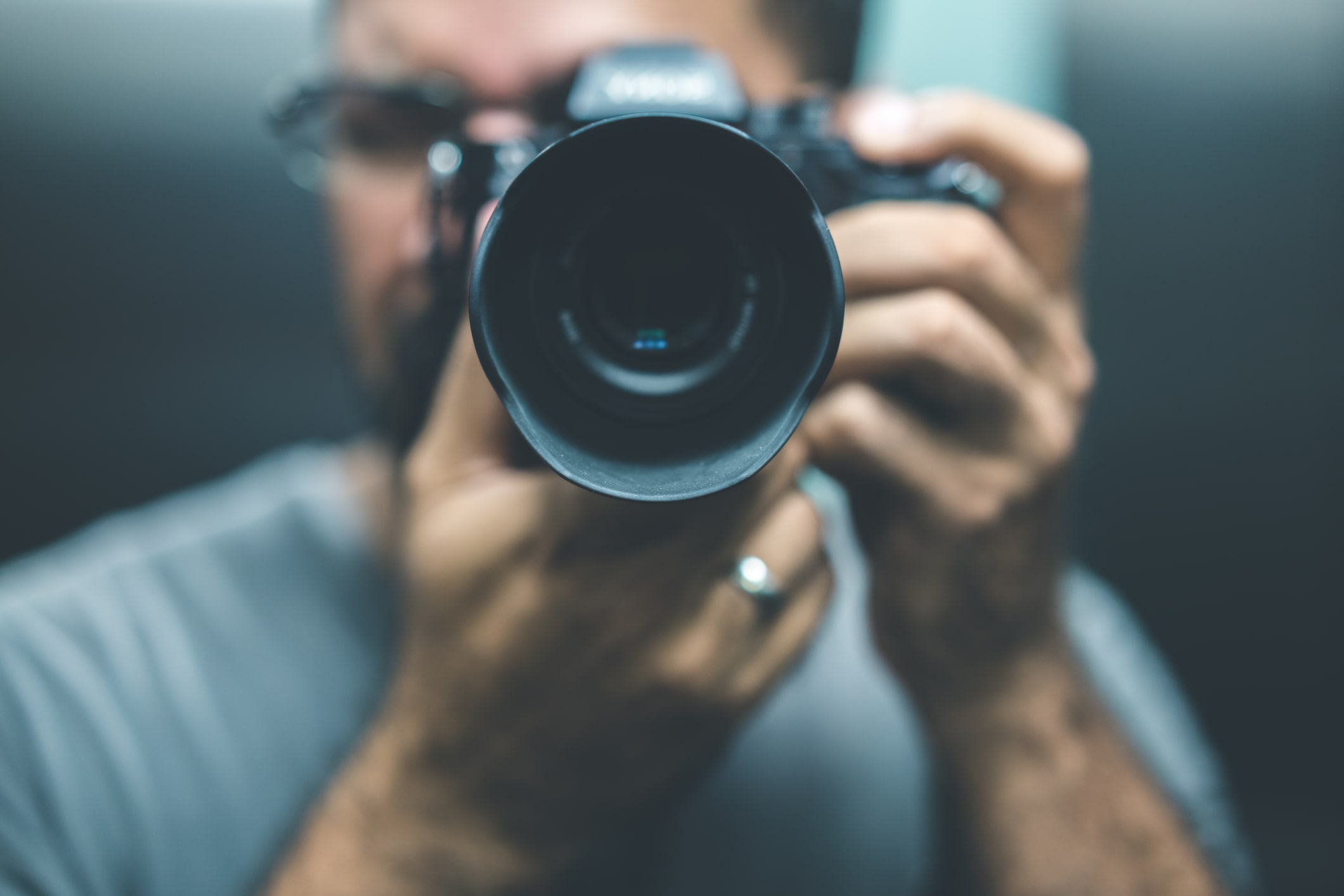 Image Credit: Pollyana Ventura via iStock
Image Credit: Pollyana Ventura via iStock
“I’m fine. My insurance policy covers everything.” But does it? It's a false statement far too many photographers have proclaimed - and they mistakenly assume that their insurance coverage is good enough.
Unfortunately, some photographers learn the hard way that not all insurance policies are the same, nor do all insurance policies offer the same types of coverage. And most importantly, no insurance policy covers everything.
It can feel like walking into a minefield when trying to figure out how to insure your photography gear...
That's where this guide comes in.
Let's discuss a few critical topics regarding getting the right insurance coverage for your photography gear.
Don't Rely on Your Homeowner's Policy to Cover Photography Equipment
 Image Credit: relif via iStock
Image Credit: relif via iStock
If you own your home (or rent, for that matter) and work from home as well, assuming that your homeowners or renters insurance will cover your photography is a big, big mistake.
Sure, these types of policies cover your personal items if a fire or theft occurs in your home. The problem is that many homeowners and renters policies specifically exclude items that are used for business purposes.
That means that the equipment you use for your photography business, such as cameras and lenses, your computer, flashes, tripods, and so forth, might not be covered if something is damaged, destroyed, or stolen.
On top of that, some homeowners and renters insurance policies only cover your personal items in the premises of your home, not necessarily when you're out and about working in the field. That leaves your gear vulnerable each and every time you head out for a photo shoot.
Read the Fine Print
 Image Credit: Devonyu via iStock
Image Credit: Devonyu via iStock
Another pitfall that some photographers face when looking for photography insurance is simply not reading the fine print.
When shopping for a photography insurance policy, you need to take the time to do some due diligence. Don’t click the first link in your Google search for "photography insurance." Instead, do a little research to find the best broker/agent who can offer the right policy for you and your specific situation.
Reading the fine print isn't exactly a fun task, but the benefits of making an informed decision to purchase an appropriate insurance policy would pay off tremendously if you ever have a claim.
I also highly recommend talking to an agent directly about your situation. Nothing beats talking directly to the insurance provider. Your insurance broker/agent should be easily accessible via email and phone, where you can ask any questions that you have and get detailed information about the coverages and exclusions on your policy.
If you work with an agent/broker who offers specialized coverages for photographers, you'll be in an even better position because they are more familiar with the most common and often biggest risks for your photography business.
Weigh Your Options
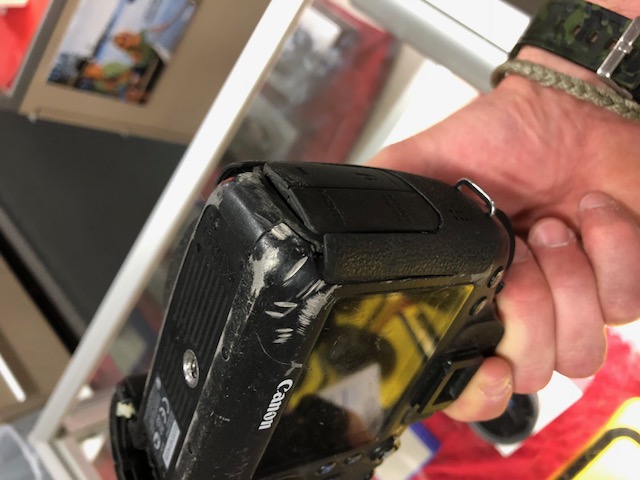
One of the most important things to consider when shopping for photography insurance is the actual policy itself.
Take Athos Insurance Services'equipment insurance policy as a prime example of what to look for. It covers:
- Floods and water damage
- Hail, lightning, and windstorms
- Earthquakes and damage from falling objects
- Fire and smoke damage
- Transit and shipping
- Explosions and acts of terrorism
- Theft
- Accidental damage, including scratches on your lenses
- Worldwide coverage
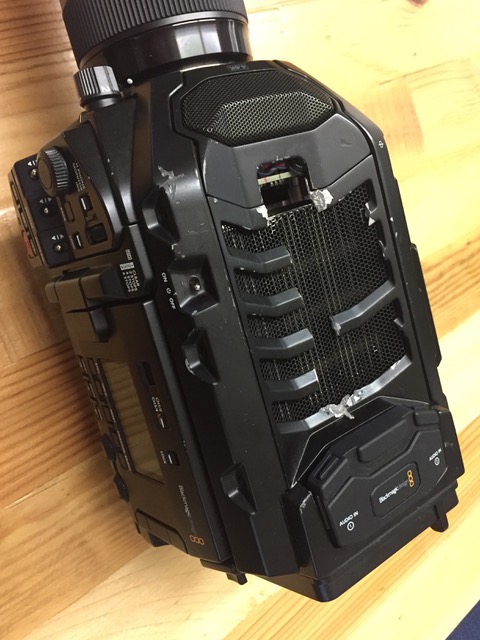
The jaw dropper coverage here is the worldwide coverage, especially since many photographers travel the world to capture their images. This means if you check your bag at the airport and see the baggage handlers throwing your bag around on the tarmac, if your pricey photography gear is damaged by the airlines, or if your bag never comes out of the carousel, you'll be covered.
Heck, you can even add optional coverage to protect equipment that's afloat or underwater.
With replacement cost coverage offered, Athos Insurance has developed an ideal photography insurance package that gives top-notch coverage, no matter if you're at home or working in the field.
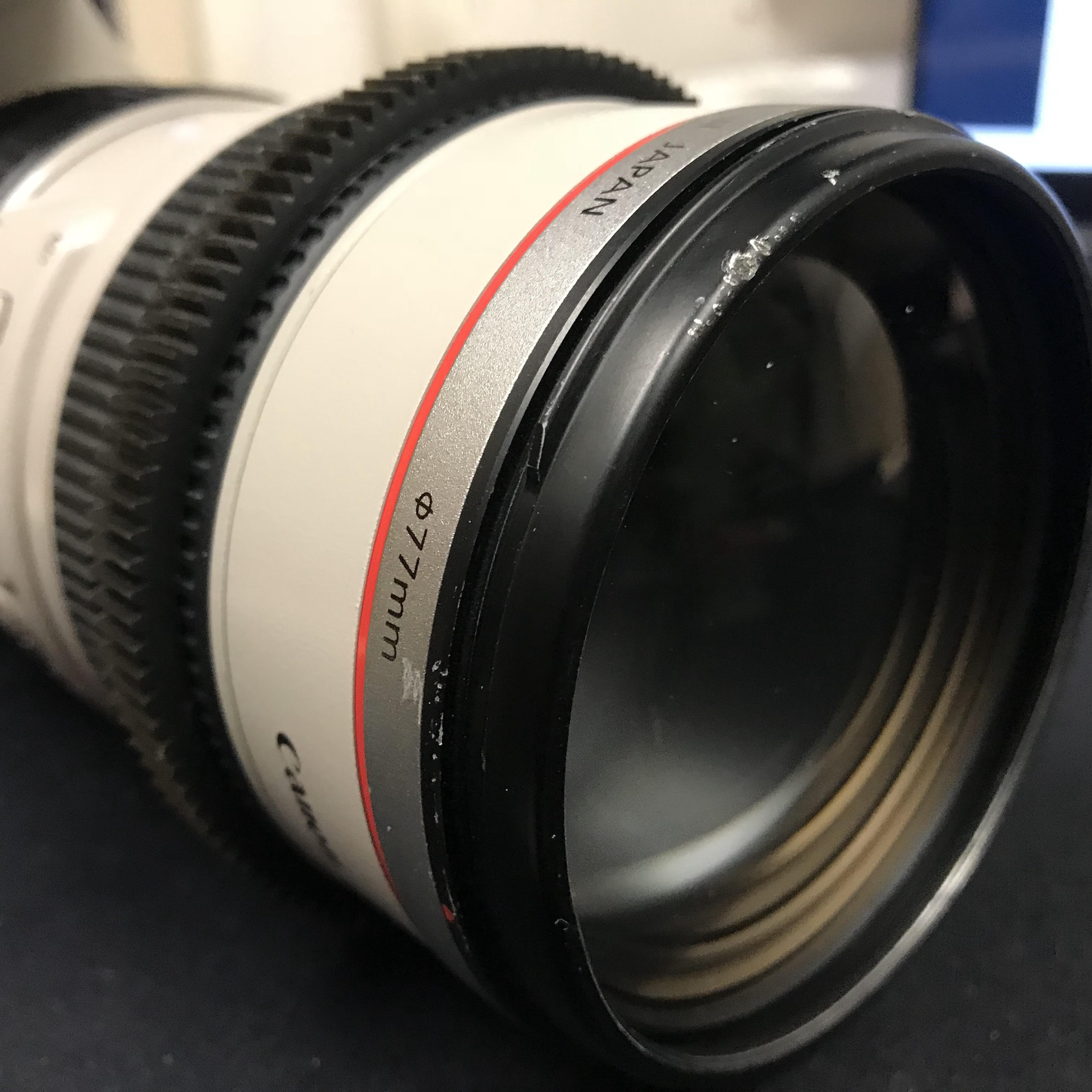
Perhaps best of all, Athos Insurance offers quick and easy quotes online with optional and specialized coverages that are easy to understand and even easier to purchase.
No matter if you need insurance to cover your gear or your business, and all points between, you can get the coverage you need online 24 hours a day, 7 days a week.
When photography is your livelihood, you simply cannot take chances with your insurance coverage.
Though we all hope nothing goes wrong and that we never need insurance, we're all just one clumsy step away from really needing it!
Final Thoughts
When you're just starting out in photography, you might think that you don't need to spend the money to have insurance coverage.
But whether you're a beginner, an enthusiast, or a seasoned pro that's been in business forever, having photography insurance is essential..
As we all know, camera gear gets really expensive, really fast. For a few bucks a year, isn't it worth it to have the peace of mind that if something goes wrong, you'll be covered?
If you ask me, having photography insurance is one of the absolute fundamental components of being a photographer. Don't get caught without the right coverage!
For more insights about getting the right equipment protection, check out the video above from ShareGrid.
We Recommend
How to Protect Your Images and Gear From Loss
One of the worst things that can happen as a photographer is losing your image files or your gear.
Unfortunately, it’s a much more common occurrence than you might think. That’s because there are many different ways your images, camera, lenses, and other things could be damaged, lost, or corrupted.
In this quick guide, I offer a few tips on how to protect your images and gear from loss and ensure that your all-important files are safe and secure.
Get Photography Insurance
 Photo by PeopleImages via iStock
Photo by PeopleImages via iStock
Photography insurance is really not an option. Instead, it’s an essential component of building a strong, healthy, and successful business.
Aside from the peace of mind that having the proper photography insurance gives you, it’s also a practical tool for helping protect the investment you’ve made in your business.
Though you certainly hope that your gear isn’t damaged by a fire or flood, a windstorm or lighting, it can - and does - happen. Look at Hurricane Maria or the recent fires in California! And when natural disasters (or manmade disasters like acts of terrorism) occur, you need to have the right insurance in your corner to help replace your gear quickly and get back to work.
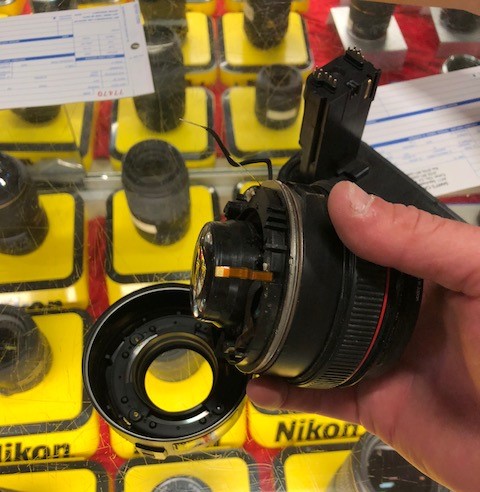
When shopping for photography insurance, be sure to do your due diligence.
You don’t want a cut-rate policy that has a lot of holes in it. Instead, get complete equipment coverage from a reputable company like Athos Insurance Services.
Their equipment policy protects you in all sorts of situations - smoke damage from a fire in your studio, a camera that’s damaged due to falling objects from an earthquake, loss of your gear during transit or shipping, and theft as well.

Better still, Athos Insurance Services offers worldwide coverage, so you don’t have to worry about something happening to your gear whether you’re at home or abroad.
Likewise, this policy offers replacement cost coverage, so your lost, stolen, or damaged gear is valued in today’s dollars, not what you paid for it at the time of purchase. Talk about peace of mind!
Having a photography business without having photography insurance is simply asking for trouble. If you’ve put off getting insured because you think you don’t have the time or money to do so, visit Athos Insurance Services to see how quick, easy, and affordable photography insurance can be.
Learn More:
Get in the Habit of Backing Up Images Immediately
 Photo by Extreme Media via iStock
Photo by Extreme Media via iStock
Though this might seem like a “duh” piece of advice, you might be surprised how many photographers lose their images because they don’t back them up in time.
Think about it - how often do you go out on a photo shoot, fill up a card or two, and then slide them into your card wallet to dump them onto your computer later on? I do it all the time, and though I’ve never experienced the trauma of losing a memory card or having one go bad with all my images on it, those eventualities happen to photographers all the time.
Waiting the rest of the day, two days, three days, or longer to back up your images is just not a good idea. The longer you wait to back them up, the higher the chances are that something will go awry and your images will be lost.
What’s more, what if your workspace is flooded or damaged by fire and your memory cards are damaged beyond repair? What if your camera - and the memory card inside - is stolen from your unlocked vehicle? What if you spill your coffee on your card reader?
Though having equipment insurance can help protect you from lost, stolen, or damaged gear, it won’t bring all those lost images back.
So, likely the simplest thing you can do to protect your images is to back them up and do so quickly.

I personally use a Synology DS918 network attached storage system to store all my photos and videos.
It's a big rig - it's got four drive bays and can accommodate up to 48TB of data - so it's a much easier and cleaner way of storing my files (as opposed to having a handful of external drives laying around.
It's small enough to sit on my desk, and is pretty easy on the eyes with its matte black finish.
But this thing isn't about looking good - it's about performance and security.

You can create over 2,000 different accounts on the DS918 and have up to 1,000 simultaneous connections.
It's got a 1.5GHz Intel Celeron quad-core processor that can dial it up to 2.3GHz when needed, 4GB of 1866 MHz DDR3L Ram (which can be expanded to 8GB), and can achieve encrypted sequential read speeds of up to 225MB per second and encrypted sequential write speeds up of to 221MB per second.
Best of all, it's easy to use with a Linux-based operating system and intuitive control panel that allows people with little or no networked storage experience to get things up and running.
If you want the ultimate in photo storage and backup, look no further than the Synology DiskStation DS918+.
Learn More:
Create an Archive of Your Digital Image Files
Though archiving your images might sound a lot like backing up your images, it’s actually a bit of a different process.
Where backing up your images is more of a short-term process, archiving your images is a long-term solution for protecting and organizing your digital image files.
That is, if you’re like me, you probably have multiple computers, hard drives, thumb drives, and cloud accounts where you’ve stored your images. That can make it extremely difficult to remember what files are saved where.
That’s where archiving comes in.
 Photo by MJ_Prototypevia iStock
Photo by MJ_Prototypevia iStock
When developing an archive of your photos, it’s important to organize them first. Give each image descriptive name files so you know what they are without having to even see the image. Also tag photos with descriptors like who or what the image is of. Then create an inventory list of each image you’ve saved in that particular drive or account.
It’s tedious work, to be sure. But getting into the habit of describing each image and maintaining an inventory will make it a much easier task to find the images you’re looking for down the road.
Additionally, the National Archives recommends saving each image in at least two different places for protective purposes. They also recommend creating new media copies every five years. The reason for this is twofold: one, to protect yourself from data loss, and two, to accommodate potential new technologies for data storage. After all, that external hard drive you bought in college isn’t going to last forever!
Learn More:
- Why Photography is a Financially Risky Business
- Photography Business Tip: How to Strike a Better Balance Between Work and Life
We Recommend
Mistakes That Could Doom Your Photography Business
 Image Credit: SIphotography via iStock
Image Credit: SIphotography via iStock
No photographer has ever successfully started their business without making mistakes. It's just the nature of the beast.
But as you embark on developing your business, you can minimize your risk and maximize your opportunities for success.
That means learning from the mistakes of others to eliminate common photography business mistakes.
Let's explore a few things you SHOULD NOT do as you build your photography business.
Photography Business Mistake #1: Not Having a Backup Plan
 Image Credit: meatbull via iStock
Image Credit: meatbull via iStock
Photography is a very cyclical business, especially if you work in the wedding or portrait photography space.
Wedding photographers, for example, are supremely busy during the spring, summer, and early fall (hopefully, anyway...). But once the snow starts to fall and the winter slump arrives, there's far less people getting married.
That means you need to establish a plan for dealing with the slower business seasons.
Perhaps you offer engagement shoots, get into the newborn photography space, or offer editing services as a means of earning extra income.
Whatever you do, don't make the mistake of thinking that you'll be busy year-round. Have other options for generating income that aren't calendar specific, and you'll put yourself in a much better place to earn a good income.
Learn More:
Photography Business Mistake #2: Blowing Your Money on Gear
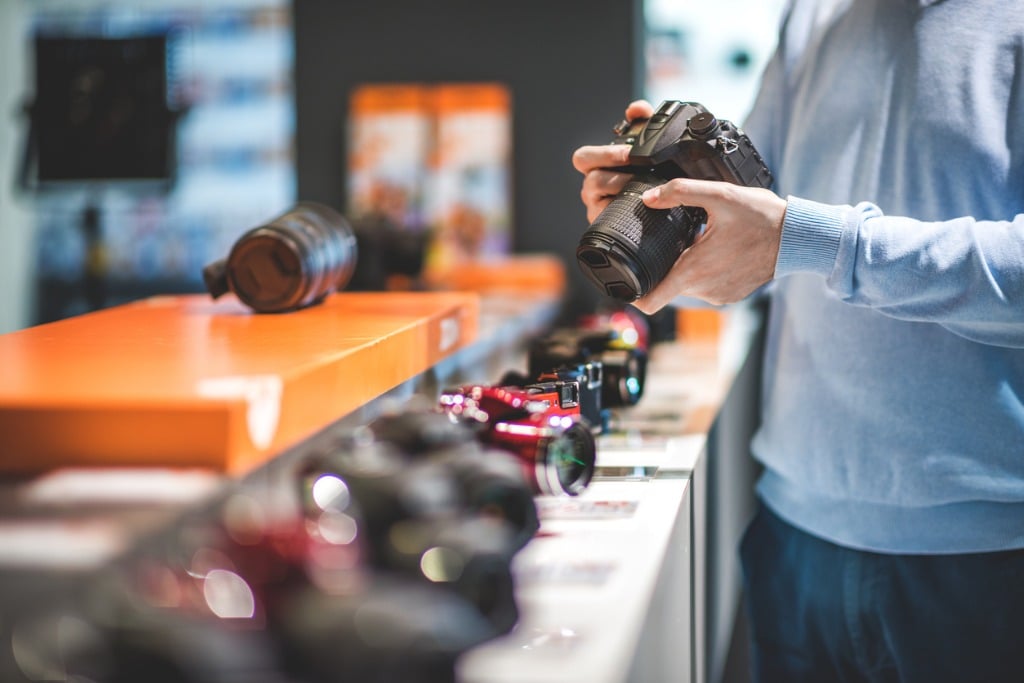 Image Credit: EXTREME-PHOTOGRAPHER via iStock
Image Credit: EXTREME-PHOTOGRAPHER via iStock
All professional photographers I know would love to get their hands on a Canon EOS R or a Nikon Z7. After all, they're the hot new cameras on the market right now.
But as awesome as those cameras are, they also have crazy price tags...
When you're starting a photography business, the last thing you need to do is empty your bank account to buy new camera gear.
If you have a six-year-old Canon 5D Mark III that still works as good as the day you got it, then keep on using that camera.
Likewise, if the Nifty Fifty you bought for $50 on Craigslist is still helping you take beautiful photos, there's no need to replace it.
Instead, save your money, or at least spend it wisely on things that you really need (like marketing and insurance) that will help move your photography business forward and protect your investment.
Photography Business Mistake #3: Not Having the Right Insurance
 Image Credit: PeopleImages via iStock
Image Credit: PeopleImages via iStock
One of the biggest mistakes new photographers make is to not review their insurance coverages.
For example, some photographers who work from home assume homeowners insurance will cover things like lost, damaged, or stolen photography gear. That's not necessarily the case because many homeowners policies exclude gear used for professional or commercial use.
That's why having the right equipment insurance policy is a must-have for all photographers.

Certain insurance companies, like Athos Insurance, offer comprehensive equipment insurance policies that will protect you in the event that something goes awry.
For example, if you live in a coastal region that's hit by a hurricane and your home is flooded, damage to your cameras, lenses, and other gear would be covered.
If you travel the world with your gear, the Athos policy covers you worldwide (with the exception of countries with US Sanctions).
Additionally, companies like Athos Insurance provide coverage for a much wider range of eventualities, including coverage for lightning, wind storms, and other weather-related events. That also includes protection in the event of a fire and resulting smoke damage.
Earthquakes and damage from falling objects are covered, as are explosions and acts of terrorism.
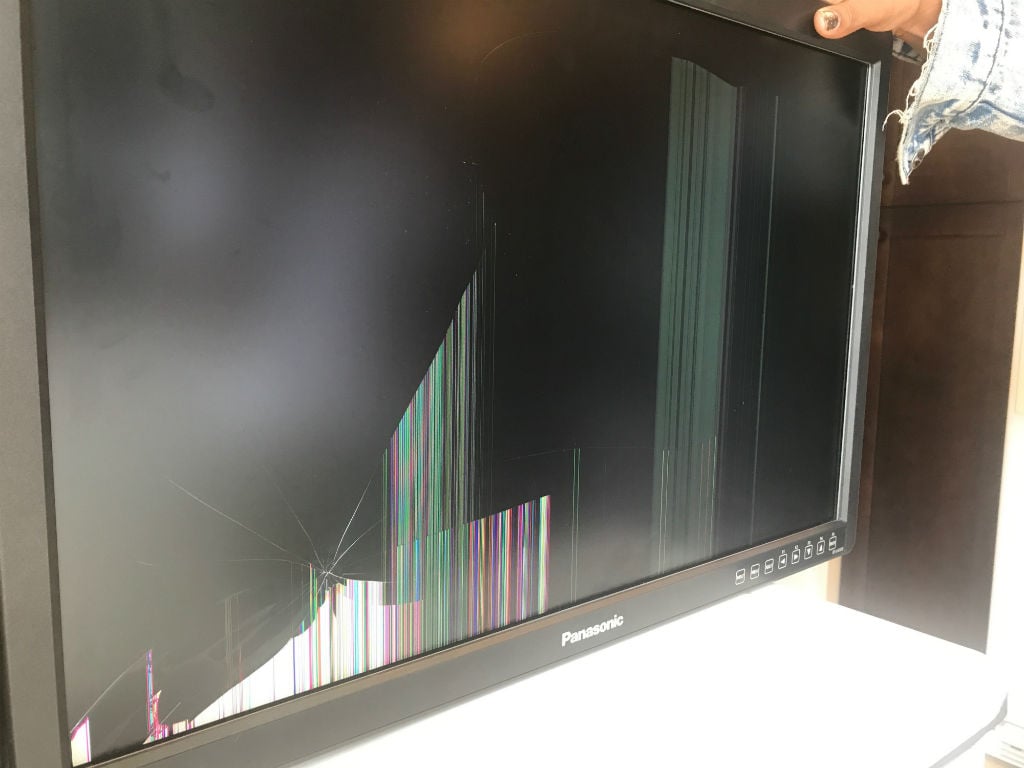
But a good insurance policy doesn't just offer you protection against major catastrophes. It also protects you from everyday events that can derail your ability to work.
The right insurance coverage will protect you from things like accidental damages, such as a scratch on your camera lens.
You also want a policy that covers theft and damage in transit or during shipment.

With replacement cost coverage offered, this means the Athos policies can replace your equipment with a brand new or like-kind (if it’s not available) item.
As if that's not enough, Athos Insurance also offers personalized service that so many insurance companies don't seem to have these days.
So, if you have a question or concern, Athos Insurance is just a call or email away. You can even quote and purchase the quotes instantly online so it's quick and easy.
What's not to like about that?!
Learn More:
Photography Business Mistake #4: Not Continuing to Learn
 Image Credit: dusanpetkovic via iStock
Image Credit: dusanpetkovic via iStock
The thing about starting a photography business is that you might feel like you know a lot, but there's always room to learn more.
Sitting on your laurels is not going to do you any favors as a photographer or as a business person.
By that, I mean that there's always something to learn - new ways to process your images, new tricks for composing your shots, marketing strategies to bring in more clients, and so forth.
This isn't to say that you need to devote half your day to learning more about photography or running a business, but setting aside time each week to sharpen your skills and deepen your knowledge will only help you as you seek to build something successful.
Photography Business Mistake #5: Not Investing in Hosting
You can have the most beautiful website in the world, but if it's never up because your host has unreliable service, there's no point, is there?
In today's world, you have to have a website to show off your photography, and that means not only having a rock-solid website that's beautiful and easy to use, but that also means having rock-solid hosting to back it up.
I've had hosting from way too many companies over the years because I could never find anyone that had that elusive combination of affordability, reliable uptime, and good customer service.
Then I found OVH...
 Image Credit: anandaBGD via iStock
Image Credit: anandaBGD via iStock
I switched to OVH three years ago, and in that time, they've proven to be exactly what I need to keep PhotographyTalk on the straight and narrow.
I've invested a ton of time, money, sweat, and tears into this company, so naturally I want a hosting company that will help me achieve my goals, not hurt me by constantly being down.
OVH promises 99.9% uptime, and they've certainly delivered over the last three years!
Though hosting isn't as sexy a topic as website design, it's still a must-have if you have any hope up building a successful business, and for my money, no host can match what OVH brings to the table.
If you can follow these easy guidelines for building your photography business, you'll be a much better position to minimize mistakes and maximize your success!
We Recommend
Myths About Photography Insurance, Debunked
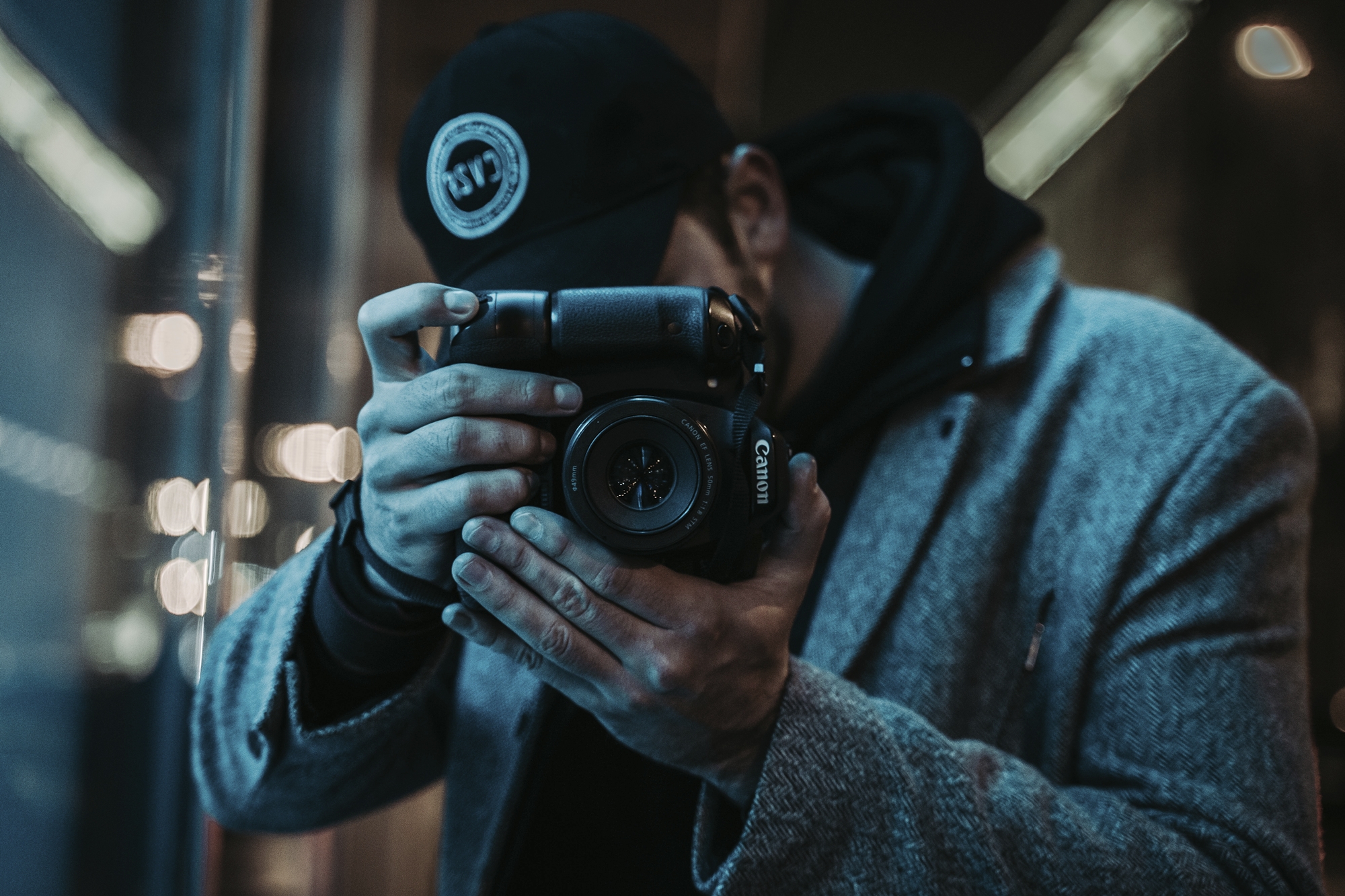
Photo by Richard Brutyo on Unsplash
Let’s face it…
For most of us, insurance can be a confusing topic. It’s no wonder then that there are so many misconceptions about the photography insurance industry.
The scariest part is that many photographers simply don’t get insurance, if for no other reason that they fall victim to one or more of the myths outlined below.
If you want to build a strong and successful business, insurance is a must-have. Get educated about the truths of photography insurance below!
Photography Insurance Myth #1: I Don’t Need It
Photo by Jakob Owens on Unsplash
Yes, you do need photography insurance!
There are things to gamble on in life, and your livelihood is not one of them! Taking a chance that nothing will happen to your camera or lens, your laptop or lighting equipment, is a chance you should not take.
No matter if you’re a studio portrait photographer or a landscape photographer that travels the world or something in between, you need photography insurance that protects you in the event that something happens to critical gear you need for your business.
Not only that, but you need comprehensive photography insurance that addresses all sorts of eventualities.
Photo by Arno Body on Unsplash
For example, Athos Insurance Services offers a wide range of protections for your gear, including damage that results from:
- Smoke and water damage
- Fire and flood damage
- Damage that results from falling objects
- Damage incurred as a result of a natural disaster like hail, windstorms, or earthquakes
- Accidental damage
Additionally, you’re covered in the event of a Nationally Declared Act of Terrorism, if your gear is stolen from your vehicle, and damage that results in transit or shipping. You can even add coverage for equipment afloat or underwater and coverage for voluntary parting or conversion. Athos Insurance also offers coverage to protect against fraudulent renters if you rent your gear to other people to use.
Best of all, this coverage extends worldwide, giving you peace of mind that if something were to happen, you will be able to replace or repair your gear no matter where the damage was incurred.
Learn More:
Photography Insurance Myth #2: It’s Expensive

Photo by Pepi Stojanovski on Unsplash
The last thing you want to do when money is tight is shell out a bunch of money for an insurance policy.
Yet, things can and do go wrong, so working without protection for your gear is like playing with fire.
Some photography insurance companies are admittedly very expensive. However, others, like Athos Insurance Services, offer equipment coverage that starts at $175.00 per year.
I’ve never been a math whiz, but even I can do that math - for $14.58 per month, you get the coverage you need to protect yourself from lost, stolen, or damaged gear.
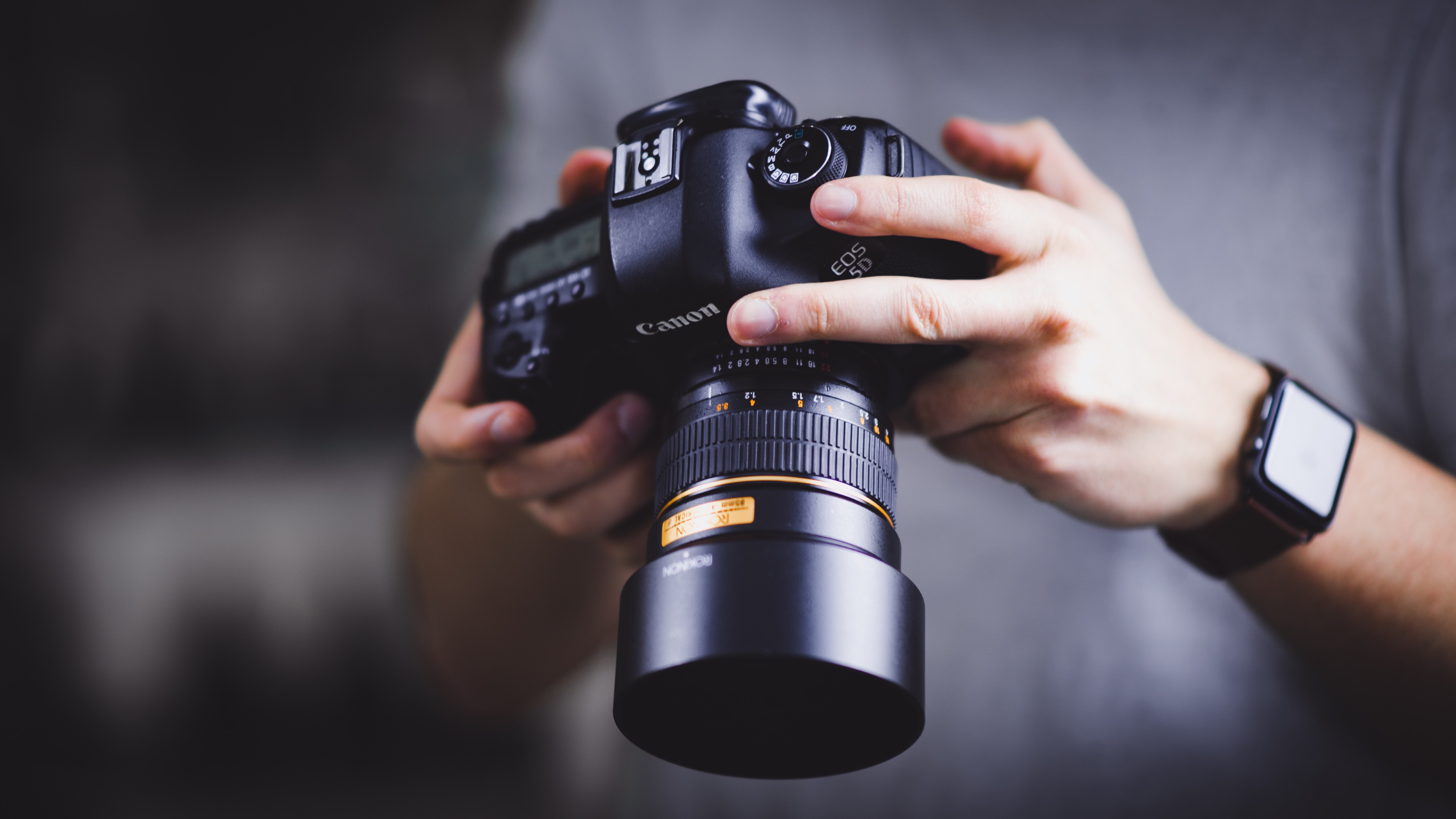
Photo by William Bayreuther on Unsplash
Of course, you hope that you never have to experience a situation in which a camera breaks or a lens malfunctions or your camera bag is washed away in a flood.
But even if none of those things ever happen to you, $14.58 per month is a small price to pay for peace of mind. Besides, should something happen to your gear, these policies offer replacement cost coverage, so you’ll get brand-new or like-kind replacements, not a check for what your gear was worth years ago when you bought it.
Photography Insurance Myth #3: It’s Difficult to Get
Photo by Maria Agudo López on Unsplash
Gone are the days when you have to go to your local insurance agent and sit in their office all afternoon hashing out the details of your policy.
Also gone are the days when you have to field phone call after phone call from a far-off insurance representative to get more information about a policy in which you are interested.
Instead, you can quickly and easily get an online quote for insurance in a matter of seconds. If you like what you see, you can buy the policy right then and there.
It’s literally a process that will take a handful of minutes from start to finish, yet it’s a process that can end up saving your business if disaster strikes!
Learn More:
We Recommend
People You Need to Rely on as a Photographer
 Image Credit: Geber86 via iStock
Image Credit: Geber86 via iStock
When it comes to your success as a photographer, it doesn't just depend on your talents, skills, and drive.
Instead, behind every successful photographer is a team of people that help make those photography dreams a reality.
While your office manager and second shooter are essential, there are a few other people you need to propel your business.
How to Be a Successful Photographer: Get an Attorney
 Image Credit: zoranm via iStock
Image Credit: zoranm via iStock
Yes, you need an attorney if you're going to be a professional photographer.
From helping you set up your business to representing you if you're sued and various points in between, an attorney is a beneficial person to have throughout your career.
Naturally, when looking for an attorney, you need to find someone with the requisite knowledge and experience in business.
You need an attorney who can help you create contracts, set up your legal business, advise you on copyright issues, and so forth.
And I know what you're thinking - why do I need to pay an attorney to do these things when I can find what I need on Google?
Well, the answer is simple - structuring your business and making legal documents is not something you want to leave to chance.
Sure, you can probably find what you need on websites like LegalZoom, but at the end of the day, are you willing to risk your business for the sake of saving a few bucks?
Since attorneys are well-versed in business topics, they should be your first call for questions related to setting up your business.
Learn More:
An Insurance Agent is a Photographer's Best Friend
 Image Credit: Steve Debenport via iStock
Image Credit: Steve Debenport via iStock
Unfortunately, accidents happen all the time, and we all have to be prepared to handle them when they occur.
A self-employed photographer needs to have the right kind of insurance to protect him or herself from losses due to damaged or stolen gear, injuries to clients, and catastrophes like flooding or earthquakes.
While we all hope to never use our insurance policy, not having one is similar to playing with fire. Think about it...
All that has to happen is for a pipe to burst in your studio or a client to trip over your camera cable for you to be in a very serious situation.
That's why having a reliable and trustworthy insurance broker is a must-have for all professional photographers.
 Image Credit: Ivan-balvan via iStock
Image Credit: Ivan-balvan via iStock
But not all photography insurance is made alike.
Some companies are in it for the money and offer shoddy coverage at exorbitant prices.
However, other companies, like Athos Insurance Services, are built to provide the best insurance options and top-quality services so you can be more successful.
Athos does this in a variety of ways.
For starters, you can buy their equipment coverage you need anytime, day or night, seven days a week on their website.
With quick and easy quotes, specialized coverages that you can customize to your specific needs, and easy-to-understand policies, there's no easier way to protect your business.

Additionally, Athos Insurance offers a comprehensive equipment policy that has you covered in just about every situation imaginable:
- Floods and water damage
- Hail, lightning, and windstorms
- Earthquakes and damage from falling objects
- Fire and smoke damage
- Transit and shipping
- Explosions and acts of terrorism
- Theft
- Accidental damage, including scratches on your lenses
- Worldwide coverage
Talk about coverage!
Whether it's water or fire, falling objects or theft, explosions or an accidental drop, Athos has you covered.

It's important to note that this kind of coverage is available worldwide, since not all insurance companies offer worldwide coverage, which leaves you vulnerable when you travel abroad.
Check out Athos Insurance and get the coverage you need, no matter where you are, that way you're protected whether you're at home, on the road, or abroad.
Learn More:
Photography Business Tip: Your Competitors are Essential
 Image Credit: Paha_L via iStock
Image Credit: Paha_L via iStock
I know this might sound crazy, but your competitors should be considered essential to your success.
Here's what I mean...
On the one hand, your competitors will keep you on your toes and drive you to be a better photographer. That type of healthy competition is crucial as you grow your business.
On the other hand, engaging with your competitors and developing a respectful business relationship can grow your more business.
By that, I mean that if one of your competitors is double-booked, and you have a great relationship with them, guess who they'll call to fill in?
Sure, you might be competing for business in your area, but at the end of the day, if you make it a point to foster a working relationship with other photographers, that will help you overall build a successful photography business.
Learn More:
We Recommend
Photography Business Tip: How to Strike a Better Balance Between Work and Life
 Image Credit: zeljkosantrac via iStock
Image Credit: zeljkosantrac via iStock
When you're self-employed as a photographer (or anything else, for that matter), it can be difficult to find the right balance between personal and professional life.
Yet, if you are unable to learn how to keep those realms of your life in good balance, you run the risk of burning out.
In this guide, I offer a few tried-and-true photography business tips that have helped me achieve my business goals while also having time to spend with my family.
Let's get started!
Rely on the Expertise of Others
 Image Credit: jacoblund via iStock
Image Credit: jacoblund via iStock
Self-employed workers are often go-getters. But if you're like me, sometimes you think you can do it all when in reality, you need help.
As a successful professional, you must surround yourself with people who can help you build and maintain a successful business.
Whether that's hiring an accountant to maintain your books and do your taxes or working with an attorney to draw up your client contracts, it’s important to surround yourself with experts.
 Image Credit: natasaadzic via iStock
Image Credit: natasaadzic via iStock
One area that I see photographers neglect is having the appropriate insurance.
Perhaps you may assume that your homeowner's insurance will cover your photography gear in the event of a flood or fire since you work from home.
However, unless you rely on the expertise of an insurance agent, you might not know that homeowner's insurance does not always guarantee coverage for professional photography gear.
I would take that a step further and say that as a professional photographer, you not only need an insurance agent but one who specializes in providing coverage for photographers.
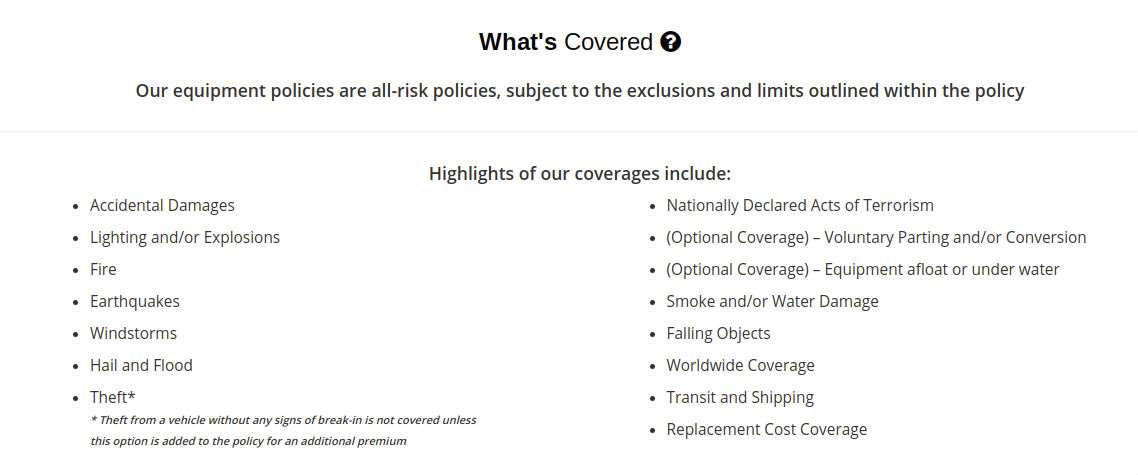
This is an important point because there are many special circumstances in which you need to have the appropriate coverage.
Athos Insurance Services, for example, offers a specific program for professional photographers that protects your gear whether you're at home, across town, or across the world.
Furthermore, their comprehensive equipment policy covers specific perils that you are likely to encounter such as accidental damage caused by water or fire. Their policy covers your gear if it's damaged in a windstorm, an earthquake, acts of terrorism, and even if it's damaged during shipping. Theft of your gear is also covered.
 Image Credit: Antonio_Diaz via iStock
Image Credit: Antonio_Diaz via iStock
But what makes companies like Athos Insurance Services so great for photographers is that they make it quick and easy to get coverage.
Let's face it - you don't have a ton of extra time to read long, confusing insurance policies and deal with difficult quoting processes.
That's why Athos offers easy online quotes 24/7. You can buy coverage that's customized to your specific needs any time, day or night!
Accidents happen, and the last thing you want to do is roll the dice and try to operate without the right kind of coverage.
Instead of spending your nights and weekends worried about what might happen to your gear or trying to decipher complicated insurance lingo, do yourself a favor and connect with Athos Insurance Services.
Relying on their experience and expertise is a great way to protect your business while helping you create a better balance between work and leisure time as well.
It's a win-win!
Learn More:
Make a Daily Schedule...But Be Flexible
 Image Credit: MajaMitrovic via iStock
Image Credit: MajaMitrovic via iStock
Let me start by first saying that working as a photographer means that you'll be working morning, noon, night, weekends, and perhaps even holidays.
That’s why setting a definite schedule for each workday can be a difficult task.
However, that doesn't mean you shouldn't try to create one.
My schedule today includes multiple calls to existing clients, a lunch meeting with a potential client, a Skype meeting with my website team, and various other activities.
Tomorrow, my schedule could be totally different.
The point is that I've created those schedules so I know what I need to do over the course of the day to prevent tasks from falling through the cracks. Besides, it's so satisfying to mark something off the schedule when it gets done!
 Image Credit: PeopleImages via iStock
Image Credit: PeopleImages via iStock
Another thing to keep in mind is to remain flexible with your schedule and not get stressed out by changes that occur.
Sometimes things happen and a client will need to push their photo shoot back by 30 minutes or perhaps even to tomorrow or next week.
But that doesn't have to be a stress-inducing event for you if you have your daily tasks outlined for a few days in advance.
When that happens to me, I simply plug something else into that time. For example, if a client is going to be half an hour late, I use that time to do a little social media marketing so I can remain productive.
There's always something to do when you're self-employed, and by being organized with your schedule and flexible with it as well, you will be able to get much more accomplished during the workday and have less to worry about when it's time to unplug from work.
Learn More:
Let Others Help You
I don't know about you, but I'm not the kind of person that usually likes to ask for help. If there's a problem, I want to fix it.
But in business, there's just some things you can't fix on your own, so you have to rely on others with the right expertise to solve the problem.
When PhotographyTalk started about a decade ago, I had constant problems with website uptime. Our host was terribly unreliable, so the website was constantly down.
It's hard to make sales when your website shows an error message...
 Photo by SolStock via iStock
Photo by SolStock via iStock
So, finally, I asked for help. A good buddy of mine that knows much more about hosting than I do recommended OVH.
I took his advice, partnered up with OVH, and it has been one of the best business decisions I've made.
I don't have to stay up nights worrying about whether the site is actually up or not, nor do I have to spend hours a week on the phone with technical support and customer care trying to figure out what the problem is.
Instead, since switching to OVH, this website has had over 99.9 percent uptime.
It might seem like a trivial thing to have reliable hosting, but trust me, good hosting is something that's easily taken for granted.
If you want a better balance between work and life, surround yourself with partners that actually deliver on their promises and give you reliable products and services.
OVH certainly fits the bill, so if you've had troubles keeping your photography website up and running, head over to OVH and experience what it's like to have worry-free hosting!
Set Boundaries and Expectations
 Image Credit: AleksandarNakic via iStock
Image Credit: AleksandarNakic via iStock
When you're self-employed, you might feel as though you need to be available to clients at all hours of the day and night. That's especially true when you're just starting out.
The problem with that is that there's no way you can be available all the time - at least not if you want to keep your sanity and prevent getting burned out.
That means that you need to set boundaries and expectations not just for yourself but for your clients, your friends, and your family, too.
Obviously when you're shooting a wedding on a Saturday night, your Monday to Friday hours of 8-5 don't apply. But making your clients aware of your typical business hours and setting that boundary will help you separate work from personal time.
 Image Credit: AleksandarNakic via iStock
Image Credit: AleksandarNakic via iStock
Setting boundaries with your friends and family is important as well.
For example, my wife gets home from work at about 4:00 pm each day, so I strive to be done with my work by 4:00 pm each day as well. This way I can spend time with her and my son.
And while that boundary that we've set works on most days, I have also set the expectation with her that sometimes I have to work later than 4:00 pm.
I have clients from all over the world, so sometimes I need to be on a call with them later in the day to accommodate their schedule.
Setting boundaries and expectations is all about communication. As long as you're clear with your clients and loved ones about what you need to do and when, you should be more successful in achieving the coveted work/life balance.
Learn More:
We Recommend
Why Photography is a Financially Risky Business
 Image Credit: mapodile via iStock
Image Credit: mapodile via iStock
When you're thinking of starting a photography business, one of the first things to consider are the different ways things could go wrong.
This isn't an exercise in being negative; it's simply a necessary step in understanding what you're getting yourself into.
In other words, you need to plan ahead. If you don't, it could spell disaster for your business.
Here are a few ways that starting and running a photography business could pose great financial risk to you.
Lost, Stolen, or Damaged Gear Could Spell Disaster
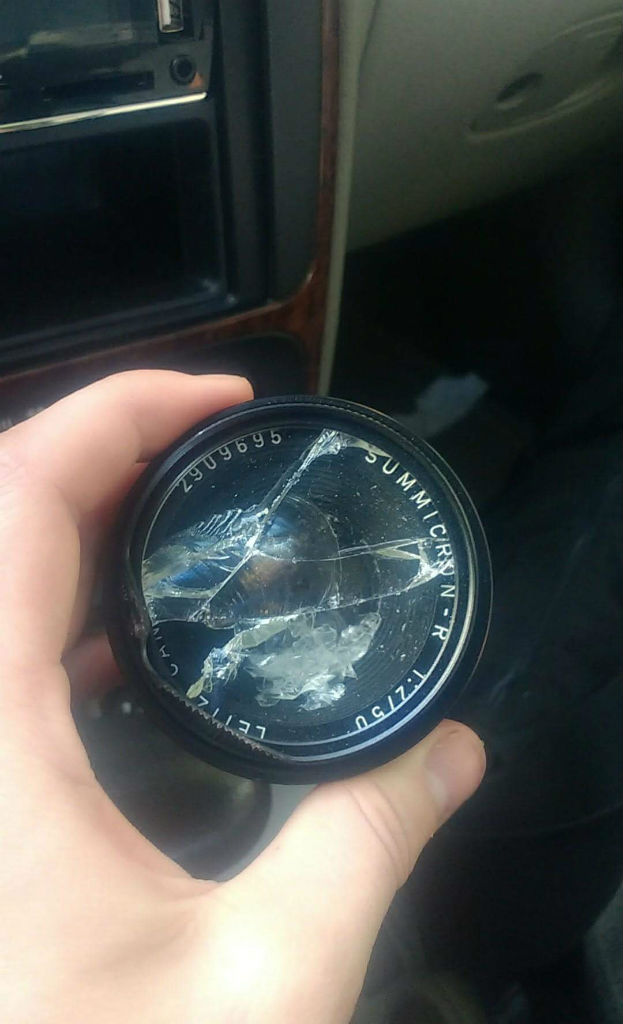
As noted above, there will come a time when your camera, lens, memory card, or another part of your kit goes down.
In some cases, they might get lost or stolen. You might drop a lens or spill coffee on your laptop. There could be a natural disaster that ruins your studio space - gear included.
Naturally, any of these scenarios poses a significant financial risk because without your gear, it's a little hard to take photos.
While we all hope that nothing goes wrong, sometimes they do, and spectacularly so. That means you need to protect your gear and yourself to ensure your business won't flounder when things go awry.
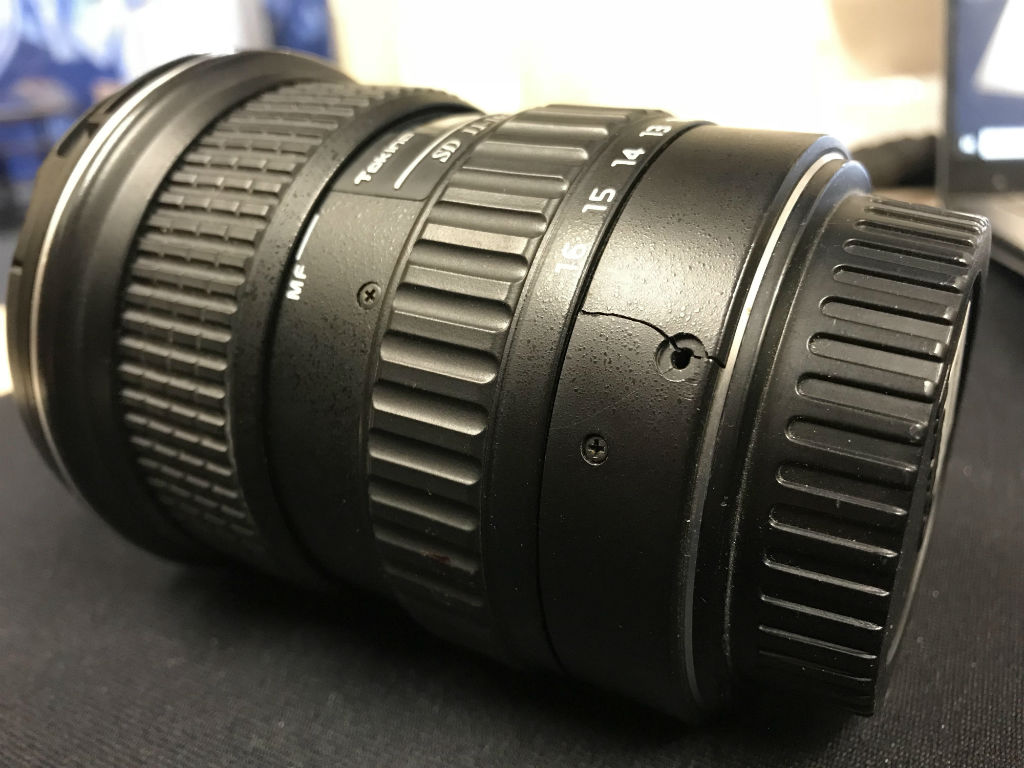
An equipment insurance policy is a must-have for any photographer.
That's true whether you only work locally or if you travel across the country or the world.
With complete coverage like that from Athos Insurance Services, you can have peace of mind that if any of the following occur, you're covered:
- Floods and water damage
- Hail, lightning, and windstorms
- Earthquakes and damage from falling objects
- Fire and smoke damage
- Transit and shipping
- Explosions and acts of terrorism
- Theft
- Accidental damage, including scratches on your lenses

And, like I said, no matter if these incidents occur at home or abroad, you'll be covered worldwide.
What's more, with replacement cost coverage offered, you get money for what your gear is worth in today's dollars without depreciation factored in.
That's a huge bonus that will help protect you against some major financial pitfalls if something happens to your gear!
Learn More:
Photography Business Risks: Unpredictable Income
 Image Credit: AndreyPopov via iStock
Image Credit: AndreyPopov via iStock
Ask any self-employed photographer what the most concerning financial aspect of their business is, and they'll likely say the instability of their income.
It truly can be a feast or famine scenario - wedding photographers, for example, nearly kill themselves working every weekend in the summer only to see their business fall off in the colder months.
However, the ebbs and flows of photography can be overcome.
You can work as a second shooter, expand your niche to include other types of photography, sell photos on stock sites, and a host of other things to earn extra income and help build a buffer for when your primary means of photography income hits a slow period.
Learn More:
Lawsuits Happen All the Time
 Image Credit: Pattanaphong Khuankaew via iStock
Image Credit: Pattanaphong Khuankaew via iStock
We live in a litigious world, so thinking that "I'll never be sued" is quite short-sighted.
Sure, the hope is that you're never sued, but the fact of the matter is that it happens to photographers all the time.
Sometimes it's because the photographer simply doesn't live up to their end of the bargain or delivers terrible products.
However, some lawsuits happen because of things like ruined memory cards or the inability to take photos due to gear that gets damaged or stolen at the last minute.
Whatever the case may be, it's necessary to have legal protections (and great insurance, too)! If you ever get sued, you can rest assured that the likelihood of your business going under has at least been reduced.
Learn More:
Final Thoughts
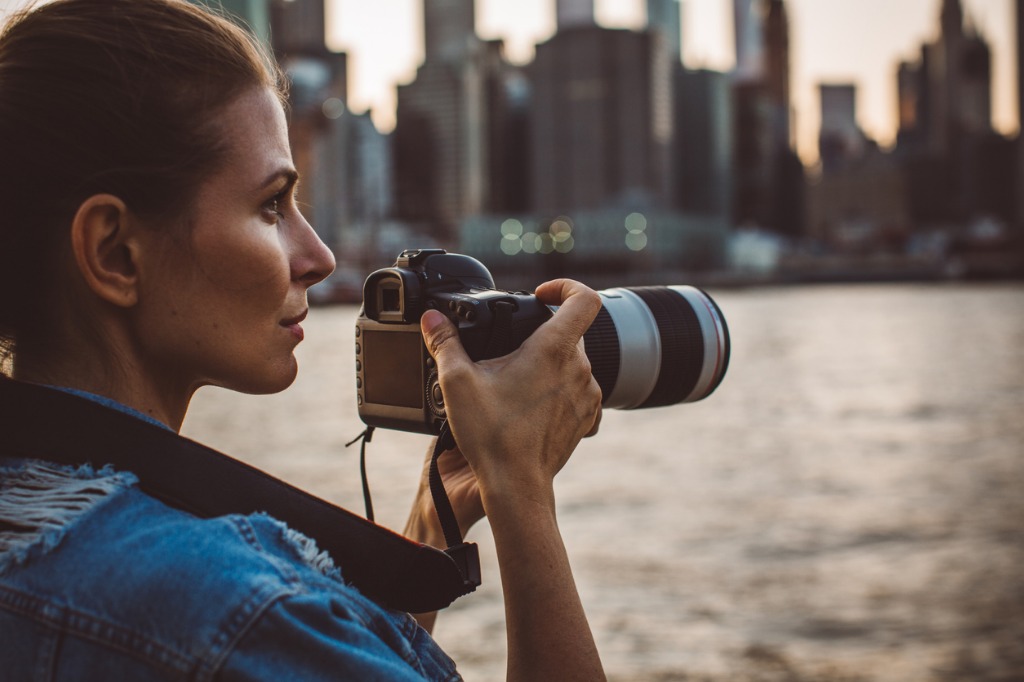 Image Credit: svetikd via iStock
Image Credit: svetikd via iStock
Yes, there's a lot that can go wrong when you work as a photographer...
In addition to the potential disasters listed above, you might damage someone else's property, crash your drone into someone's head, or fall ill and not be able to work.
But despite all that can go wrong, photography is a hugely rewarding profession. Besides, there are things you can do to protect yourself against the potential financial risks.
Get educated. Get insurance. Consult with attorneys and accountants to get your business set up the right way.
If you can do those things and be smart about your business approach, you can insulate yourself (as much as possible, anyway) from business disasters.

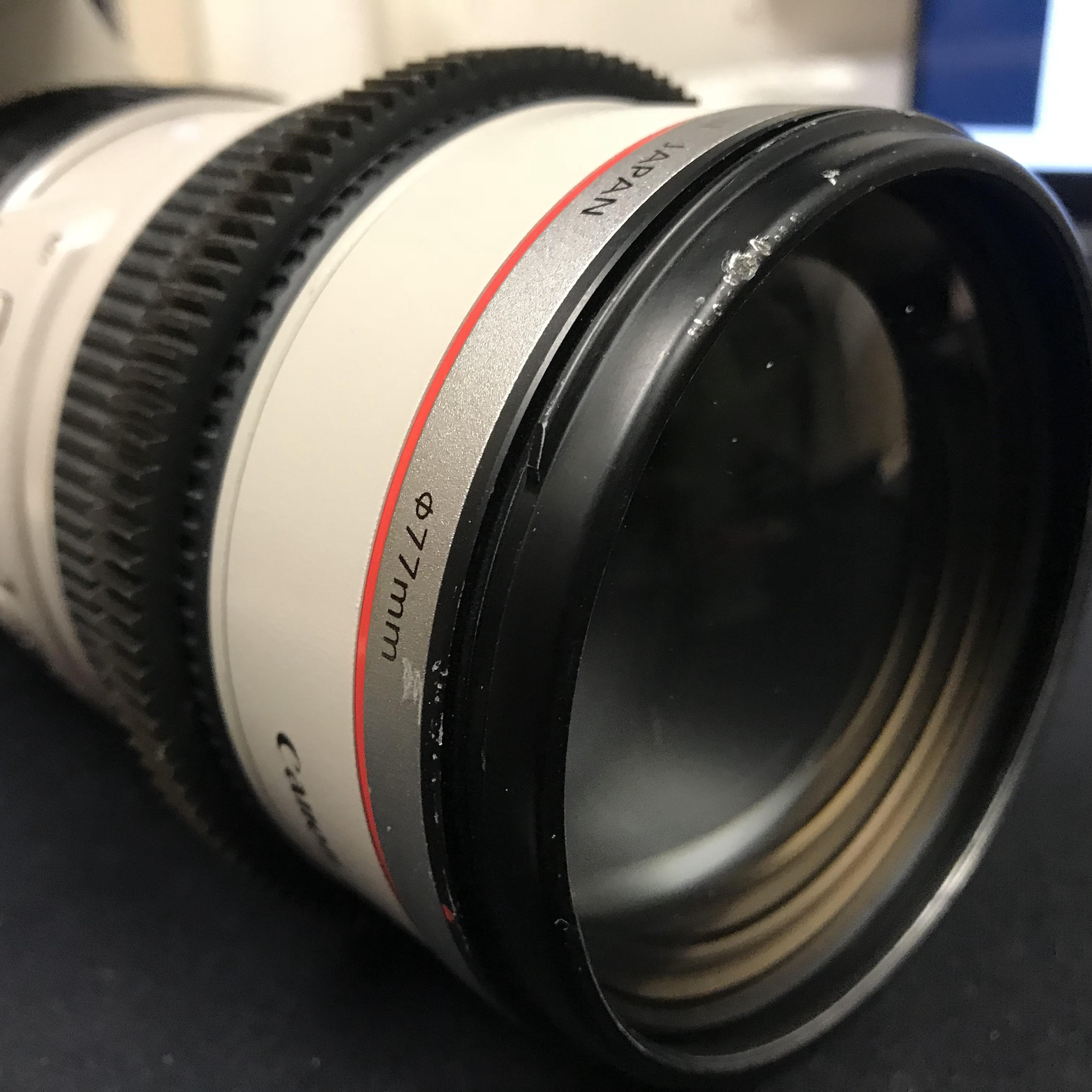
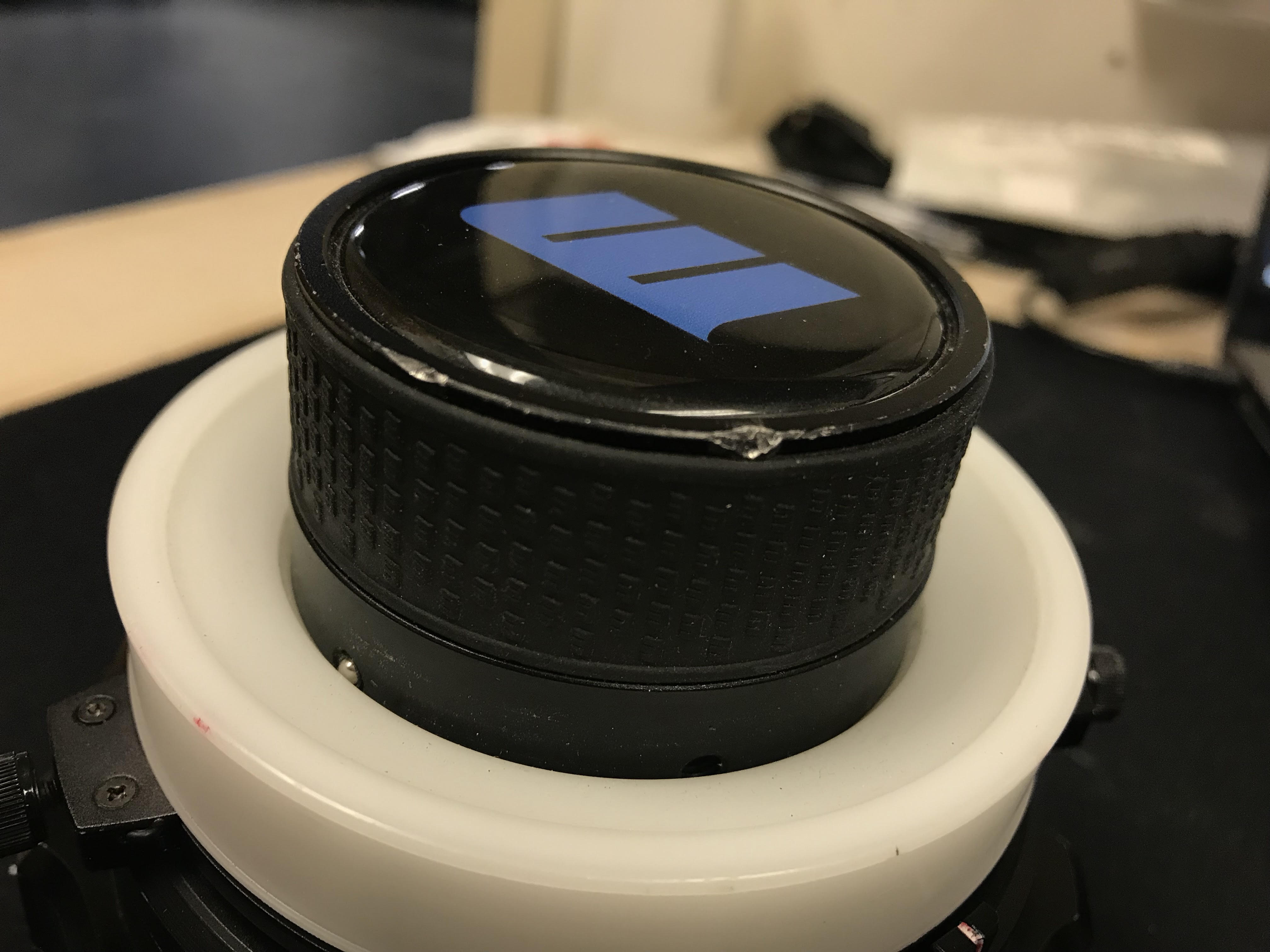
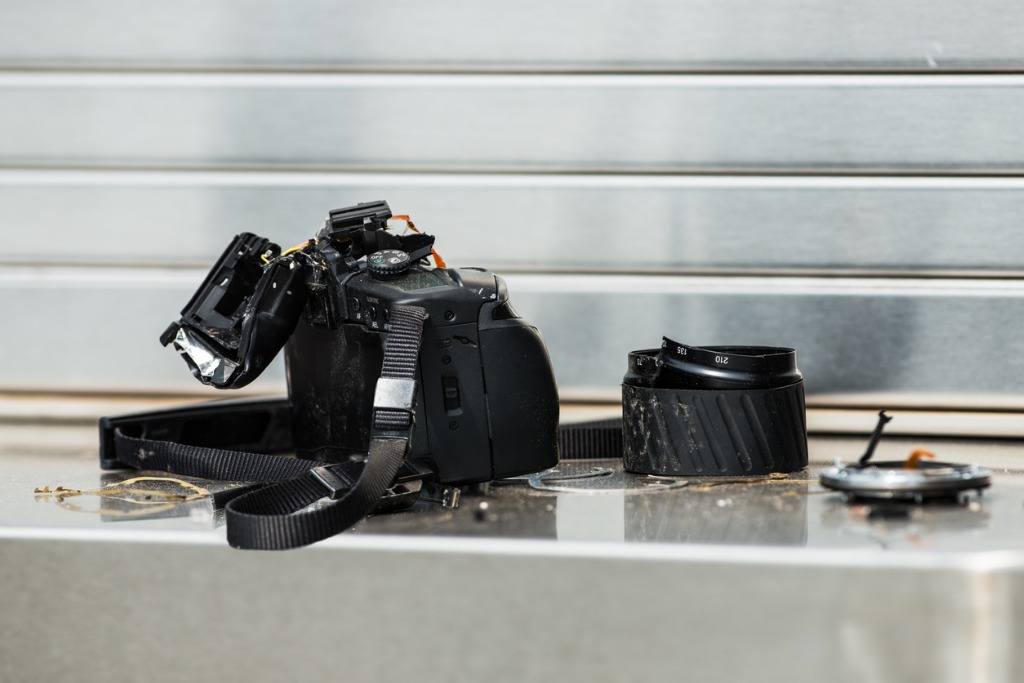
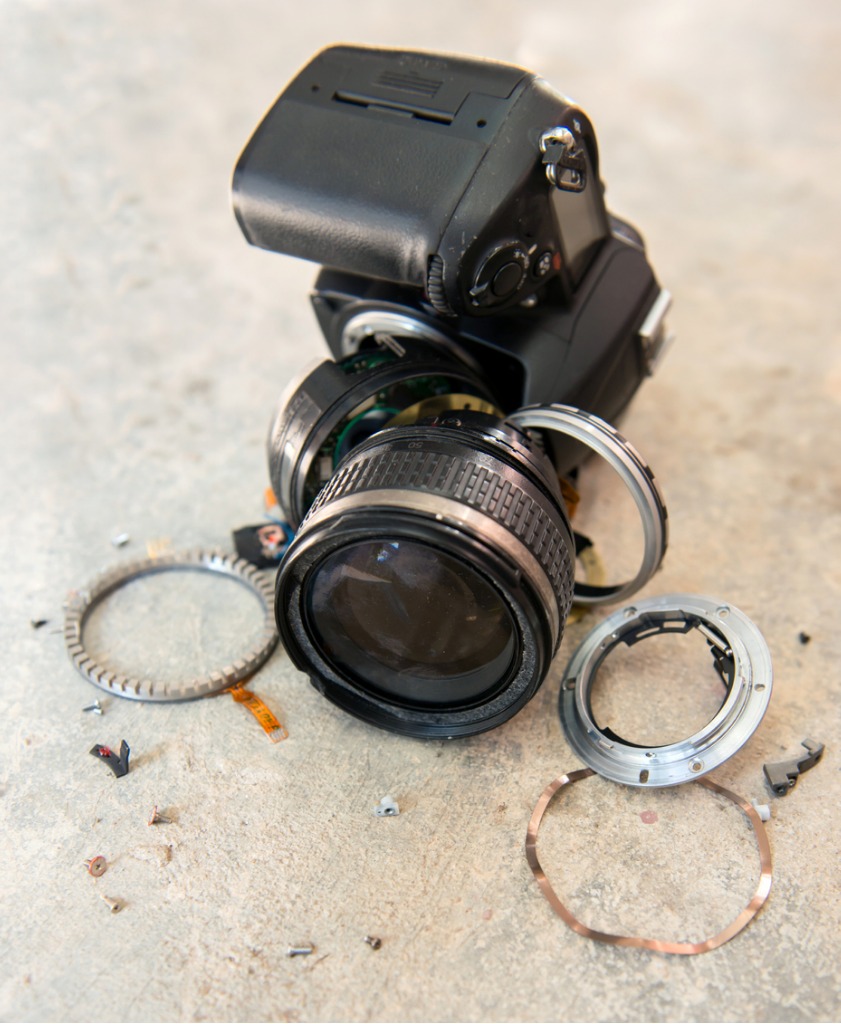





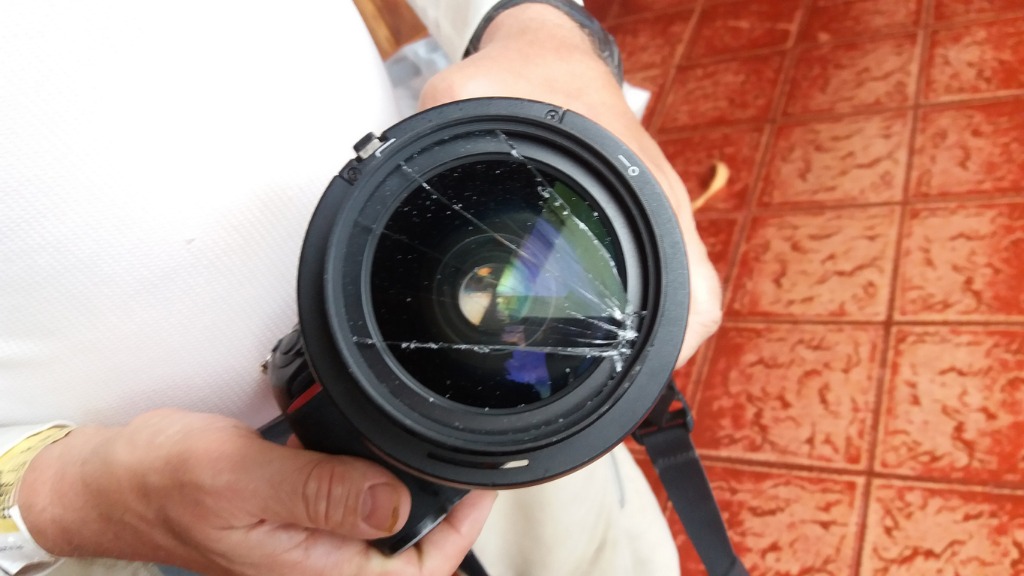
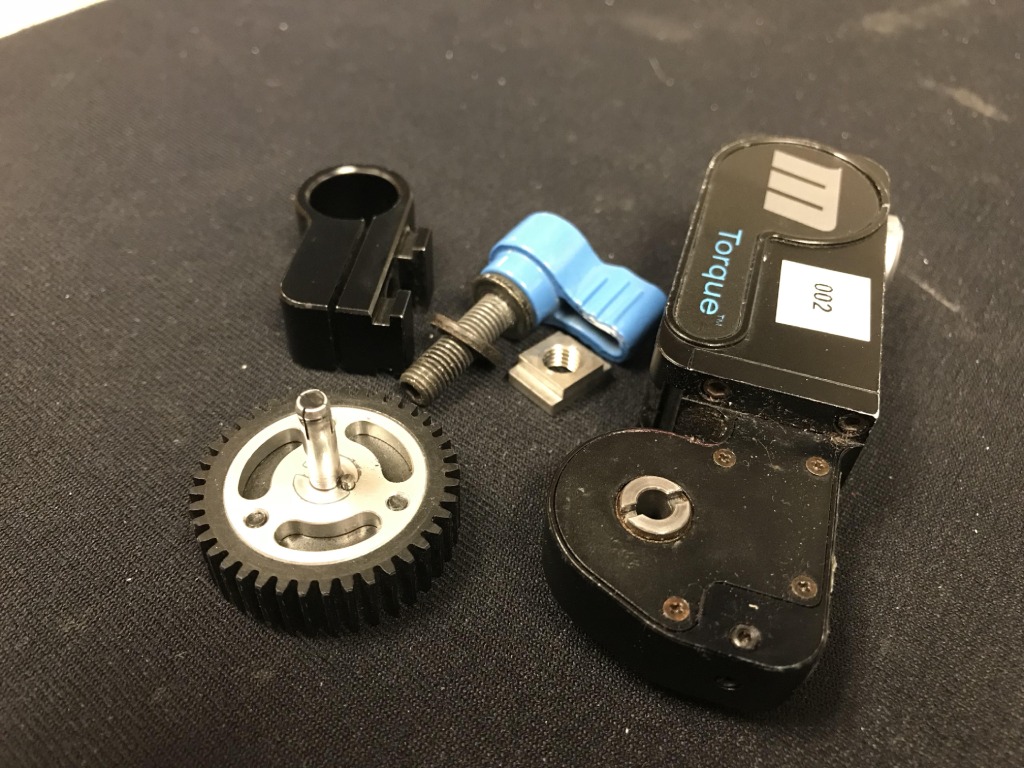
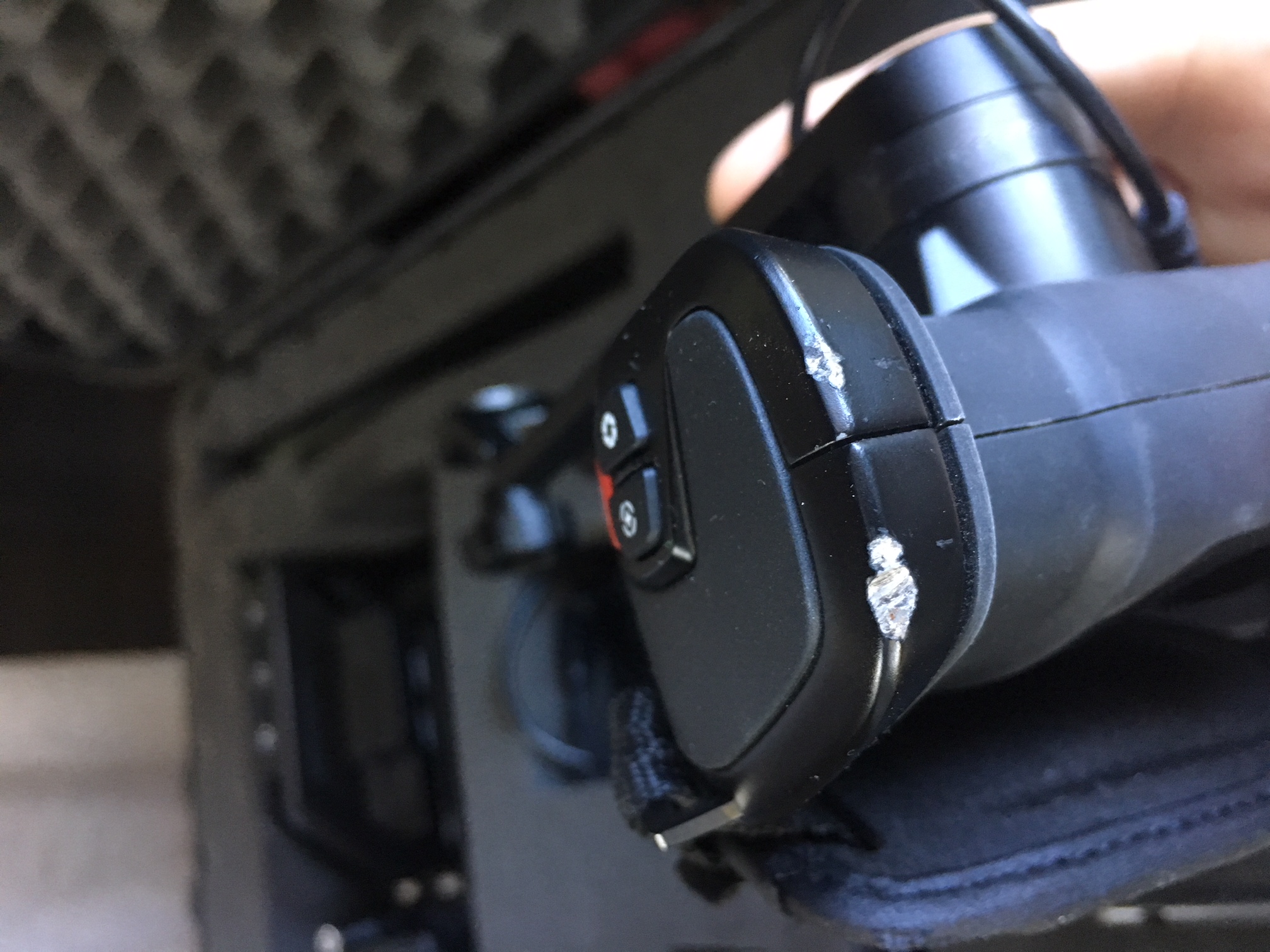
 Photo by
Photo by 
 Photo by
Photo by 

